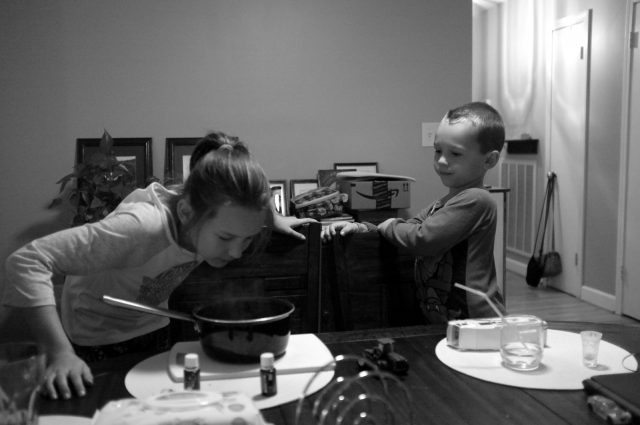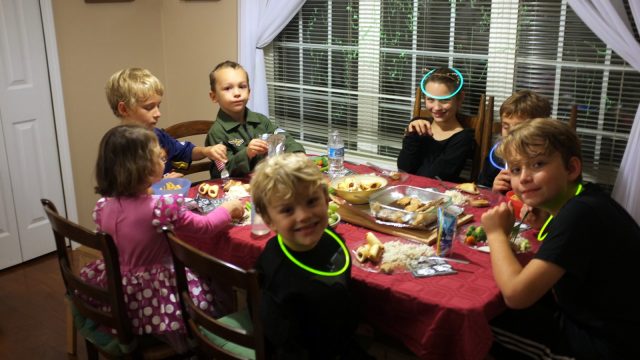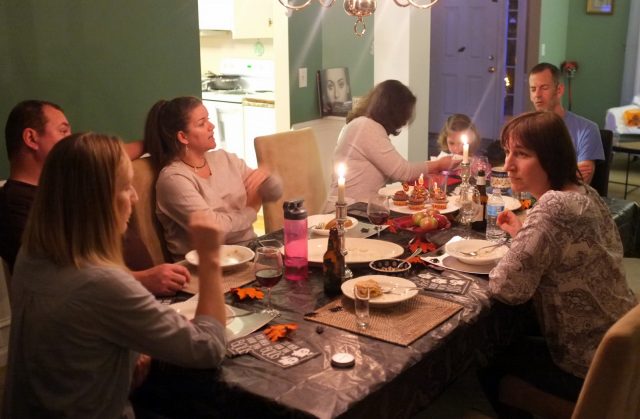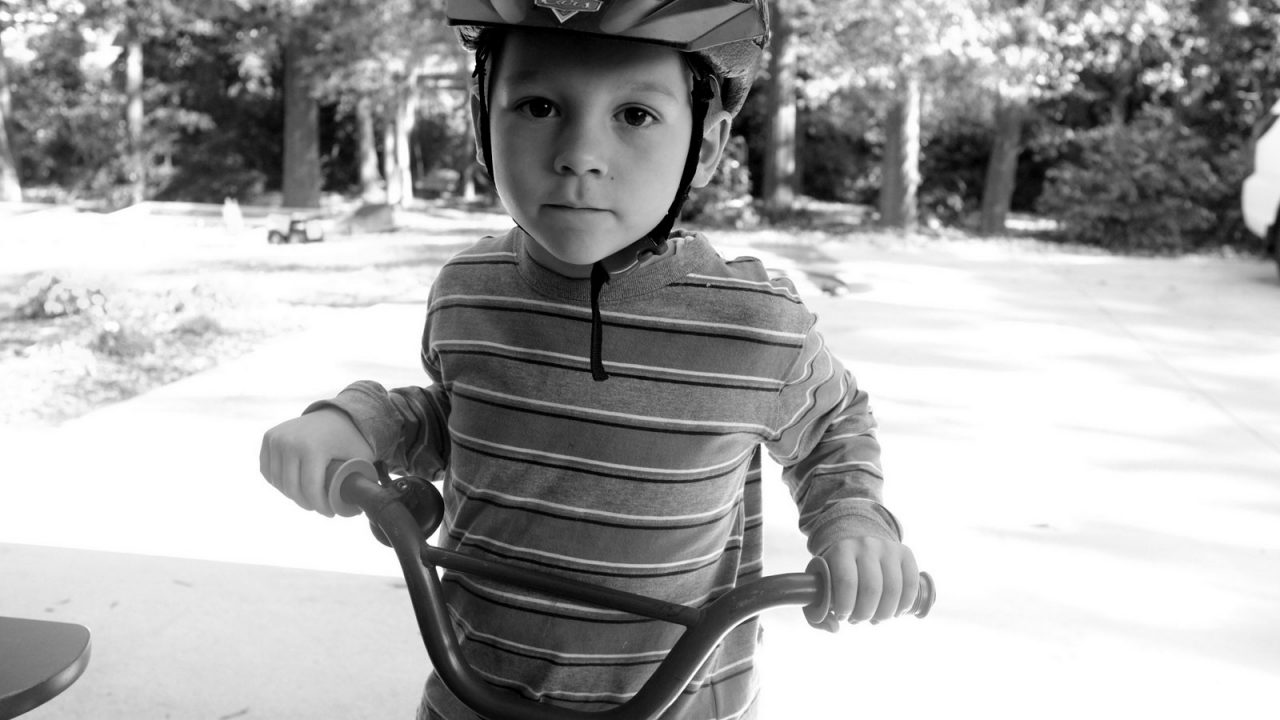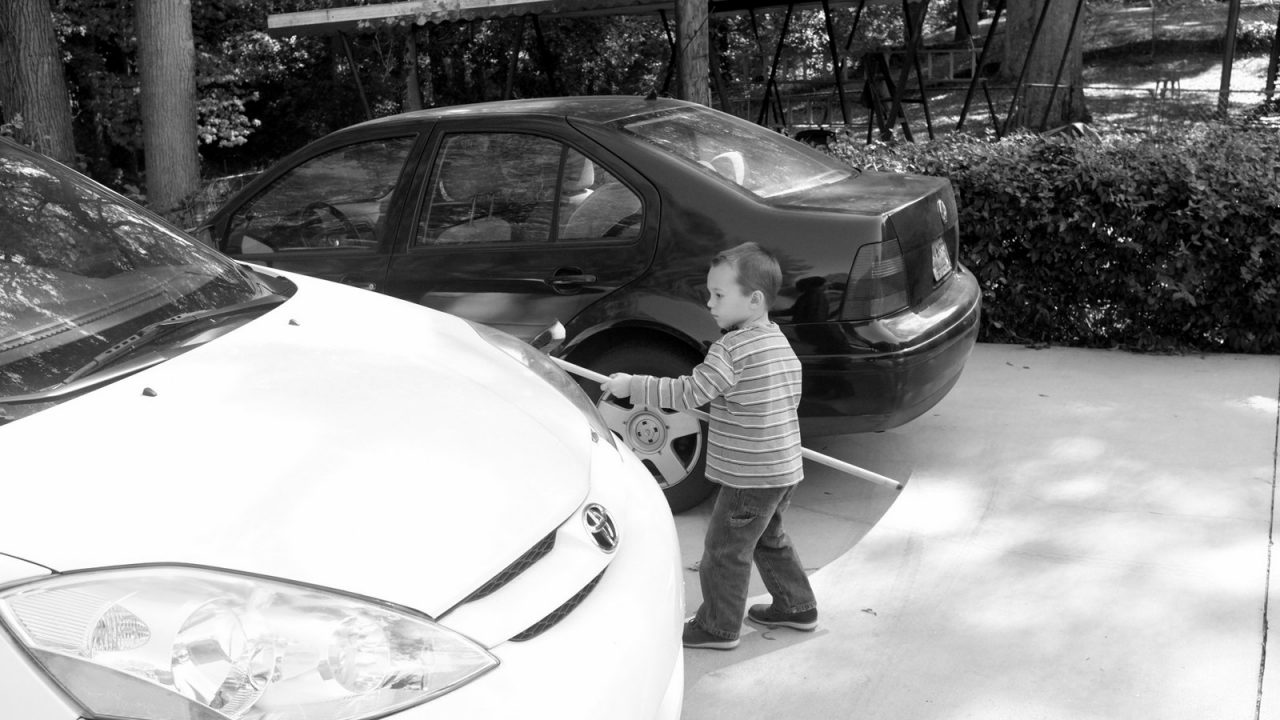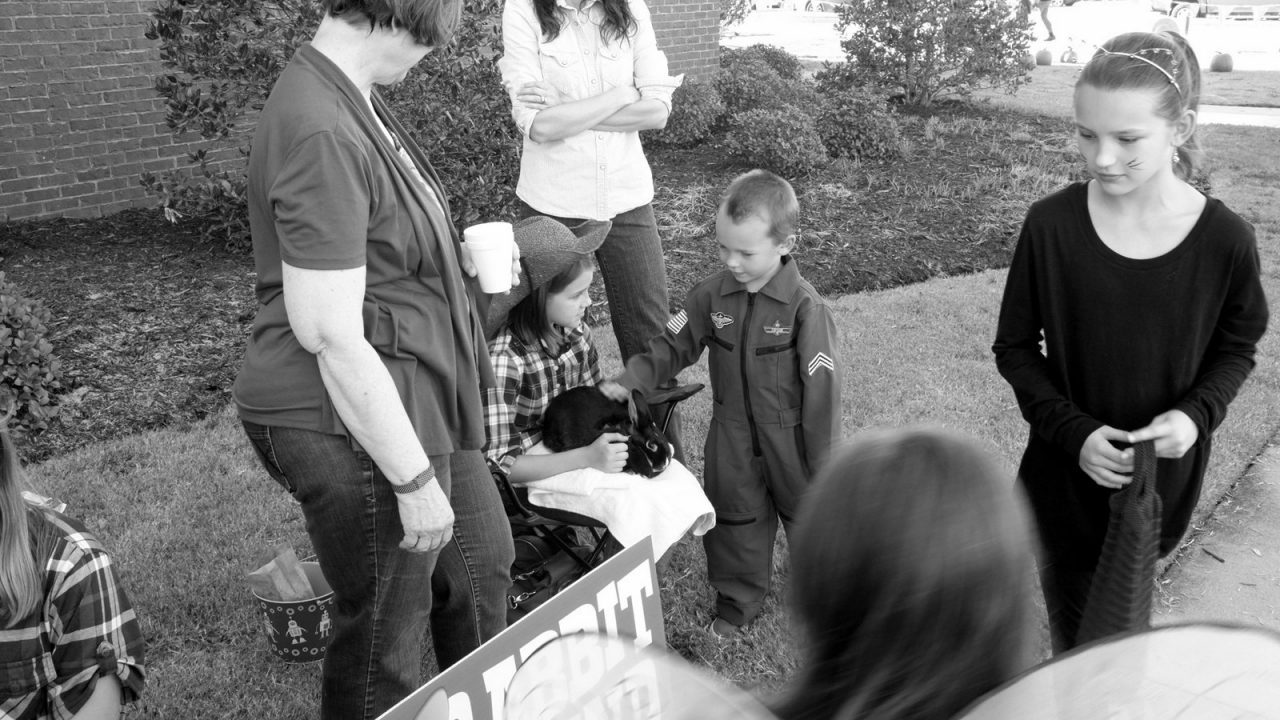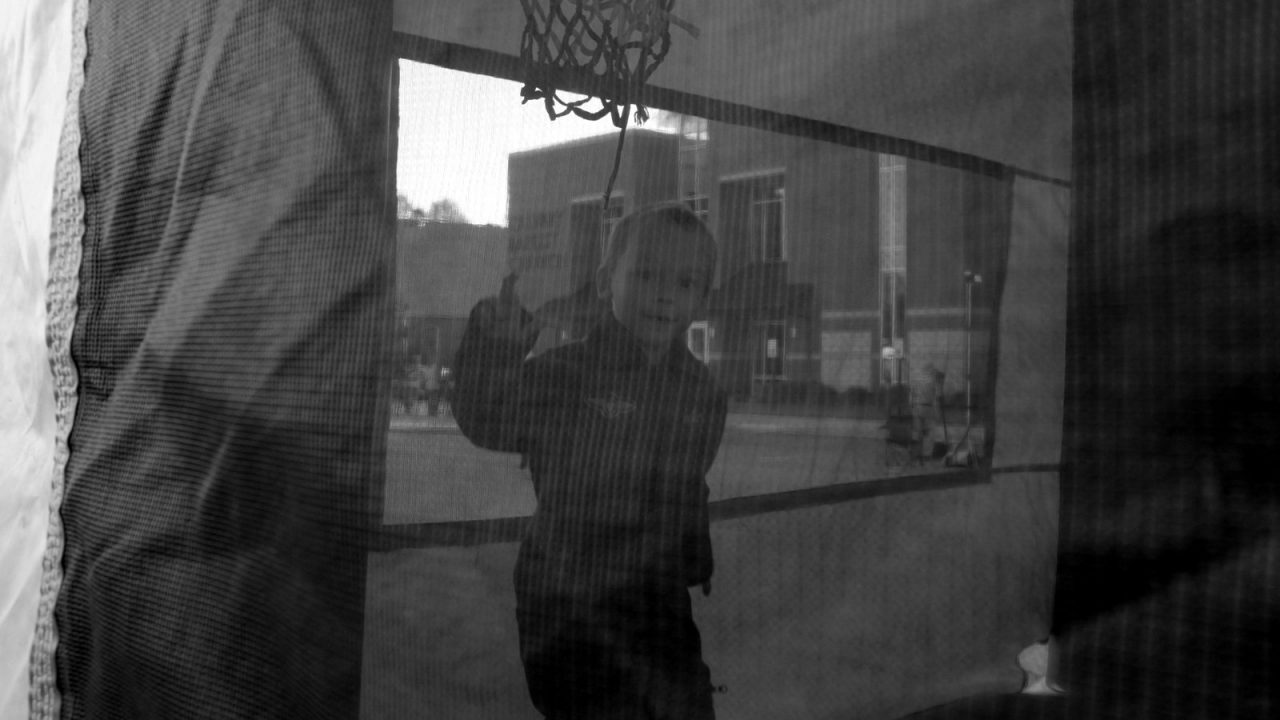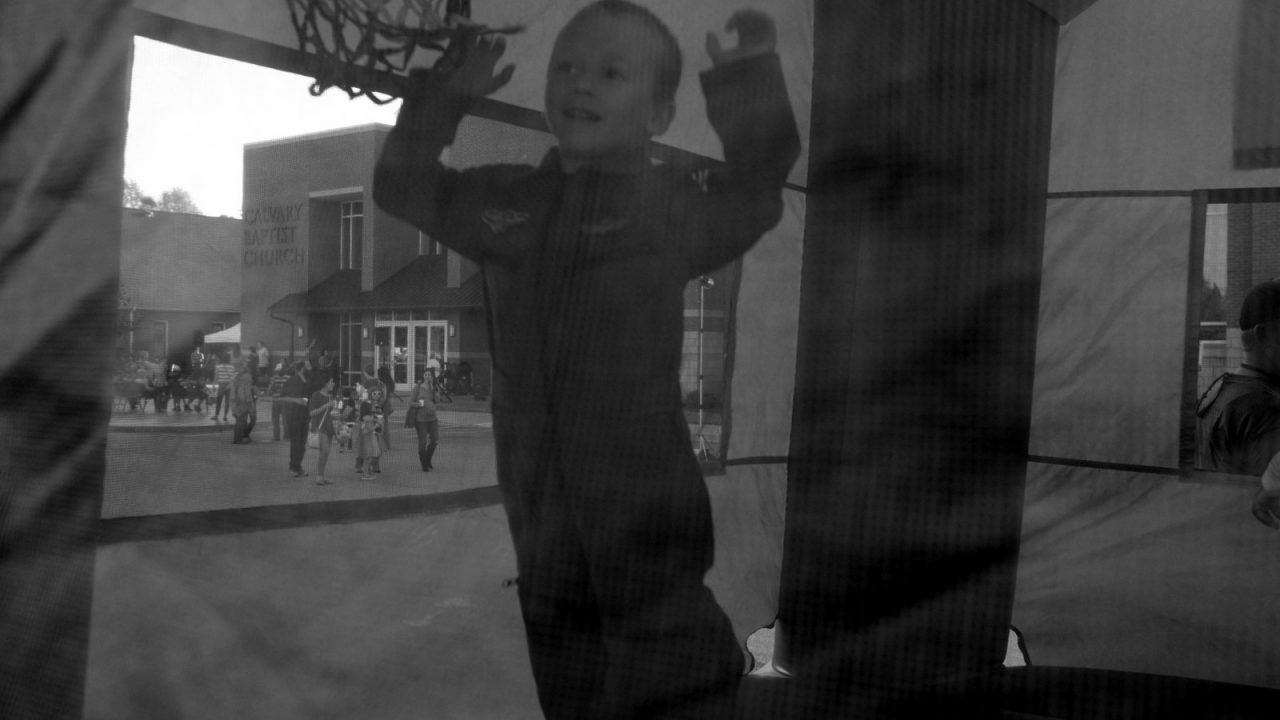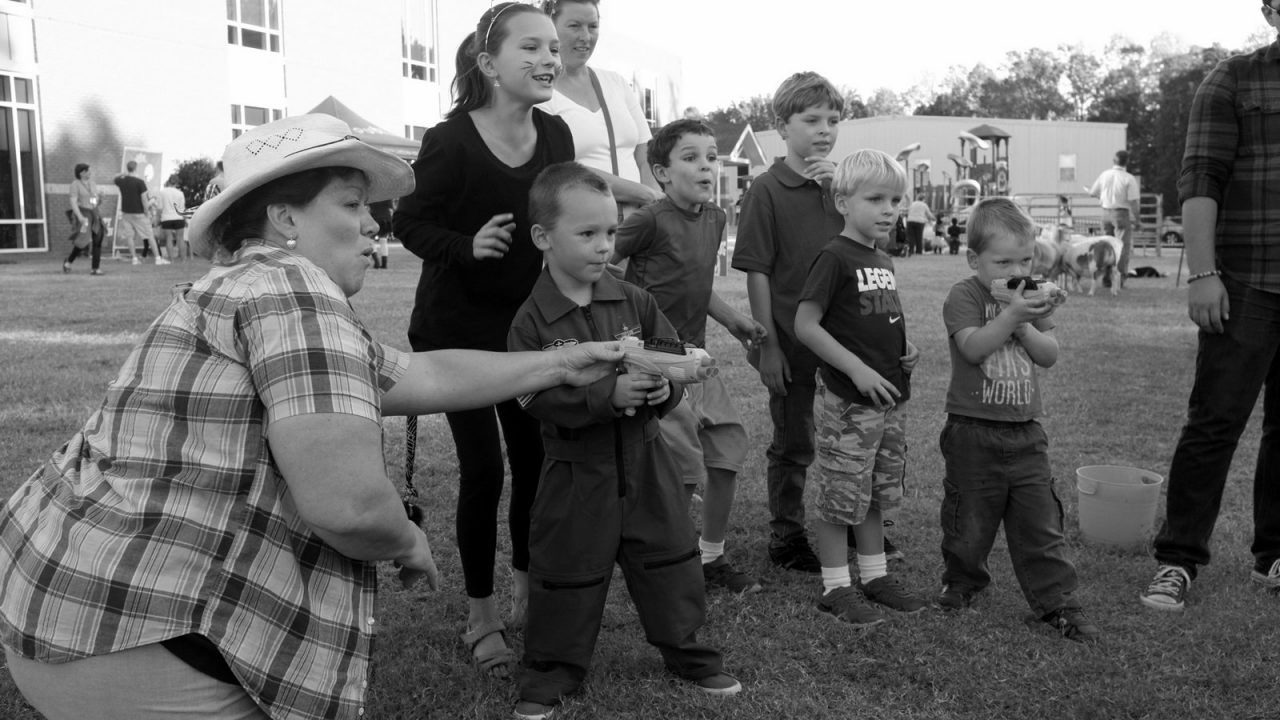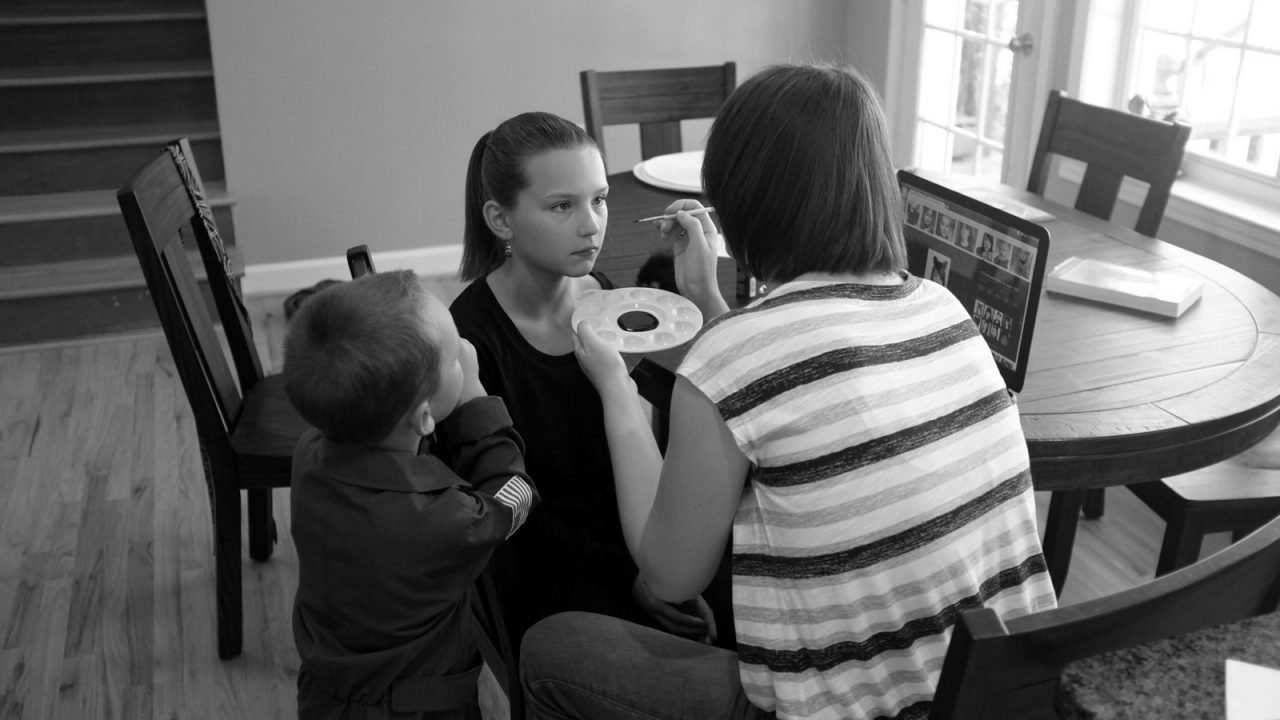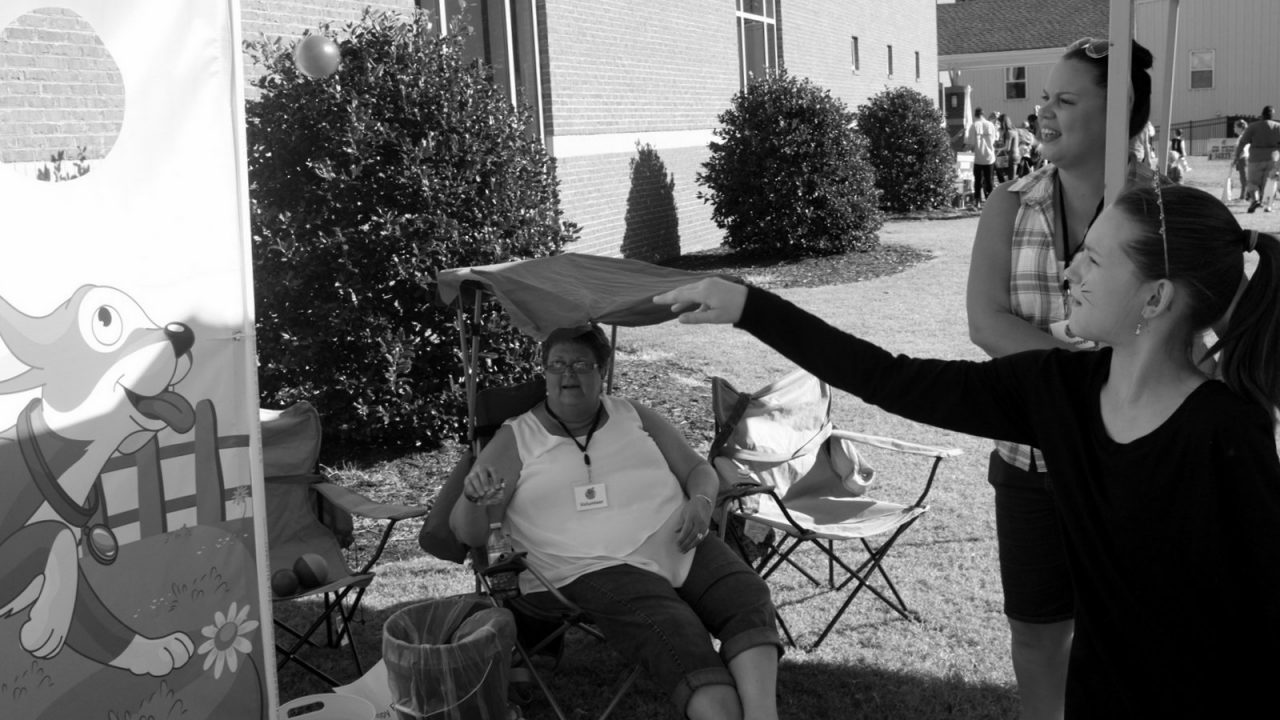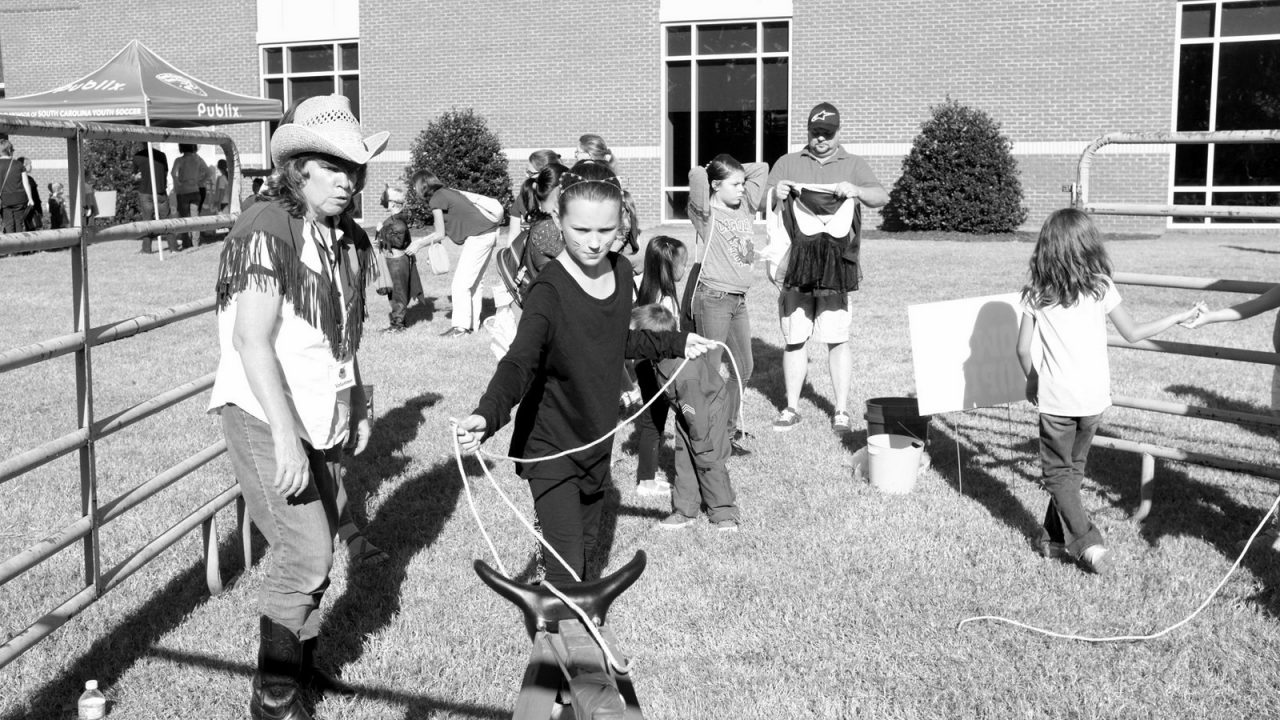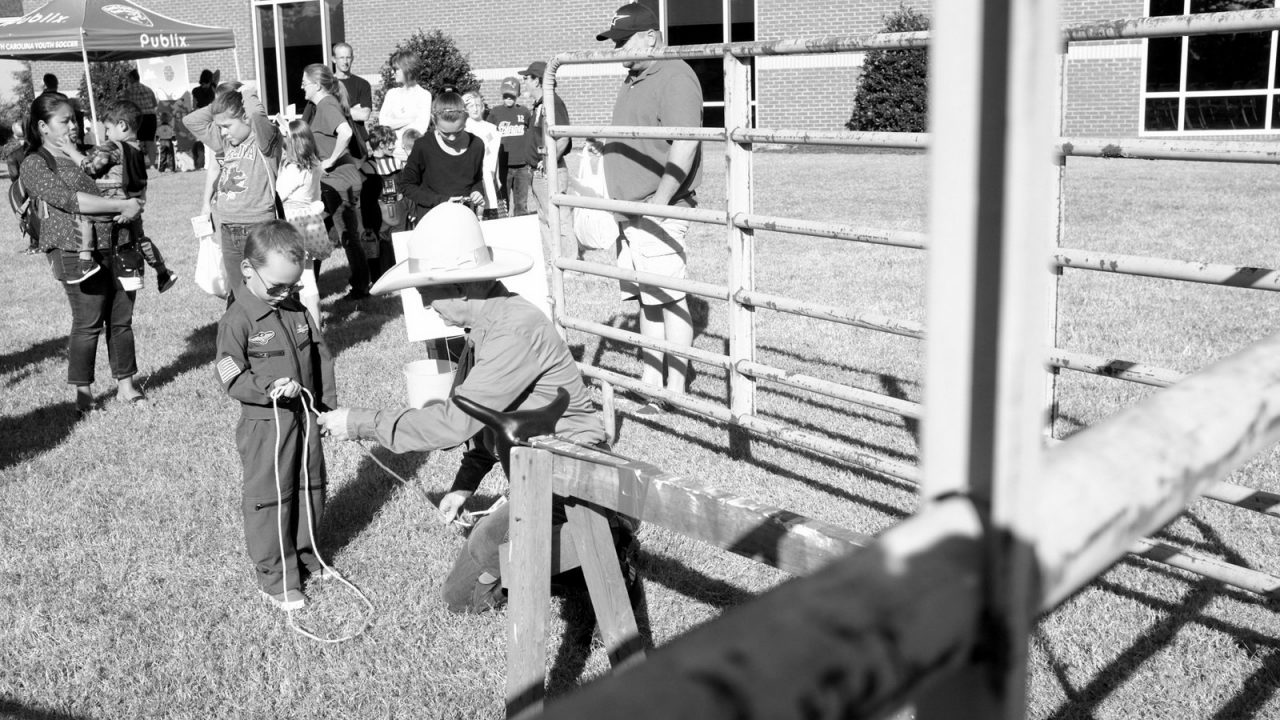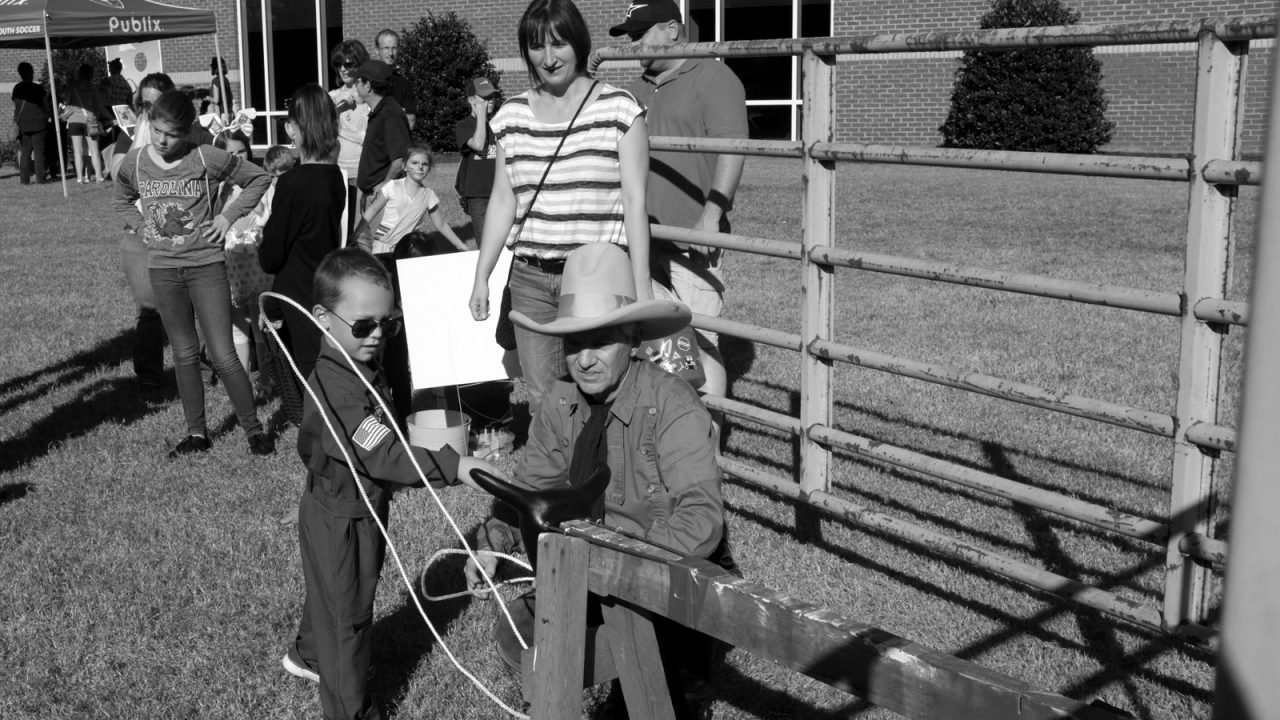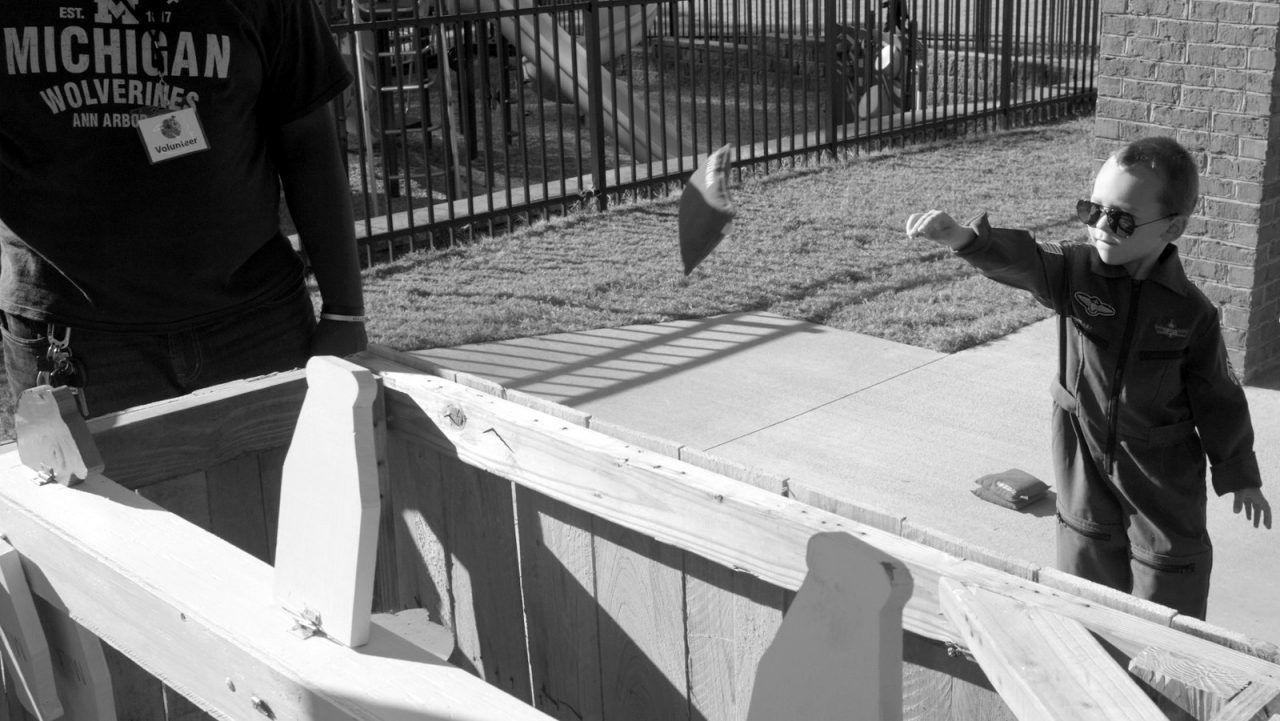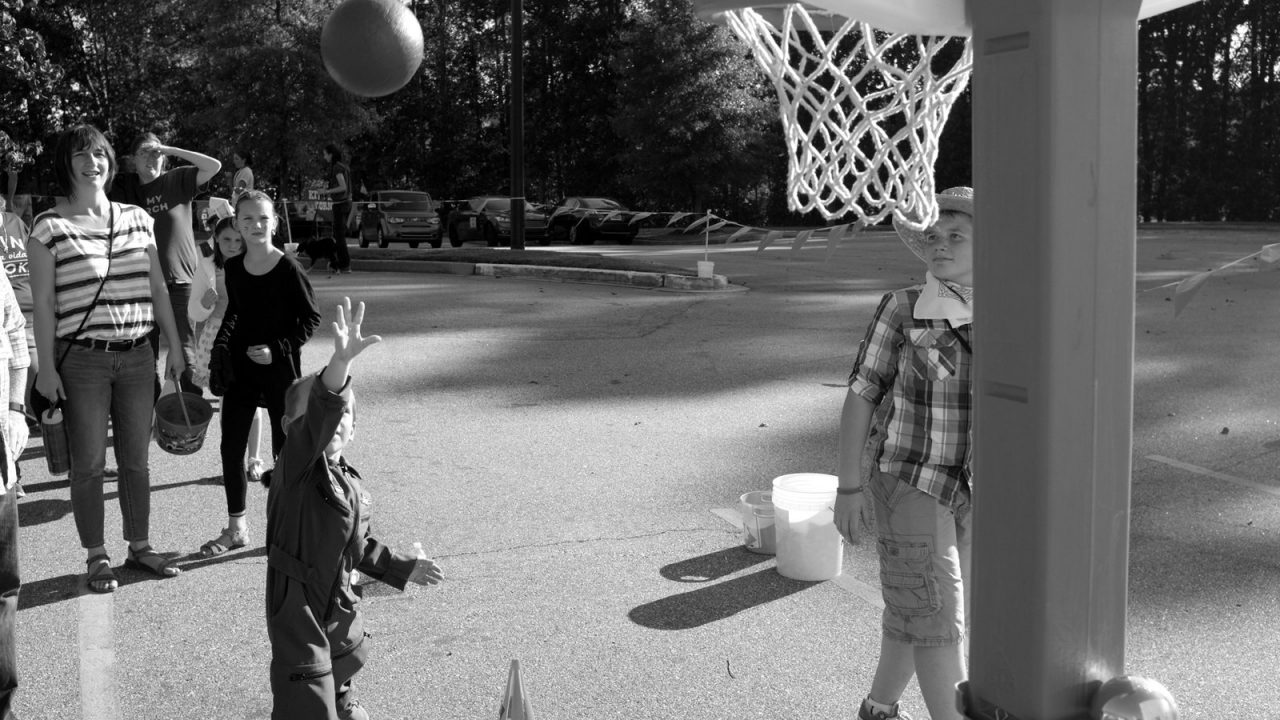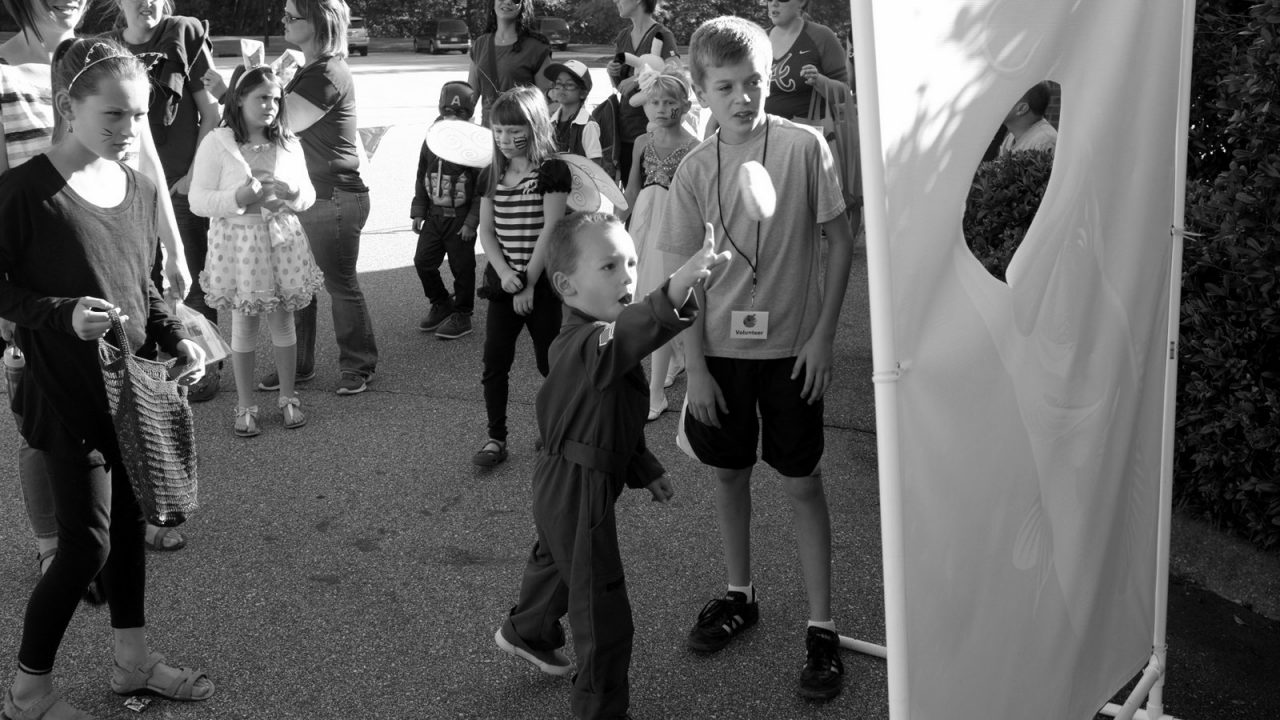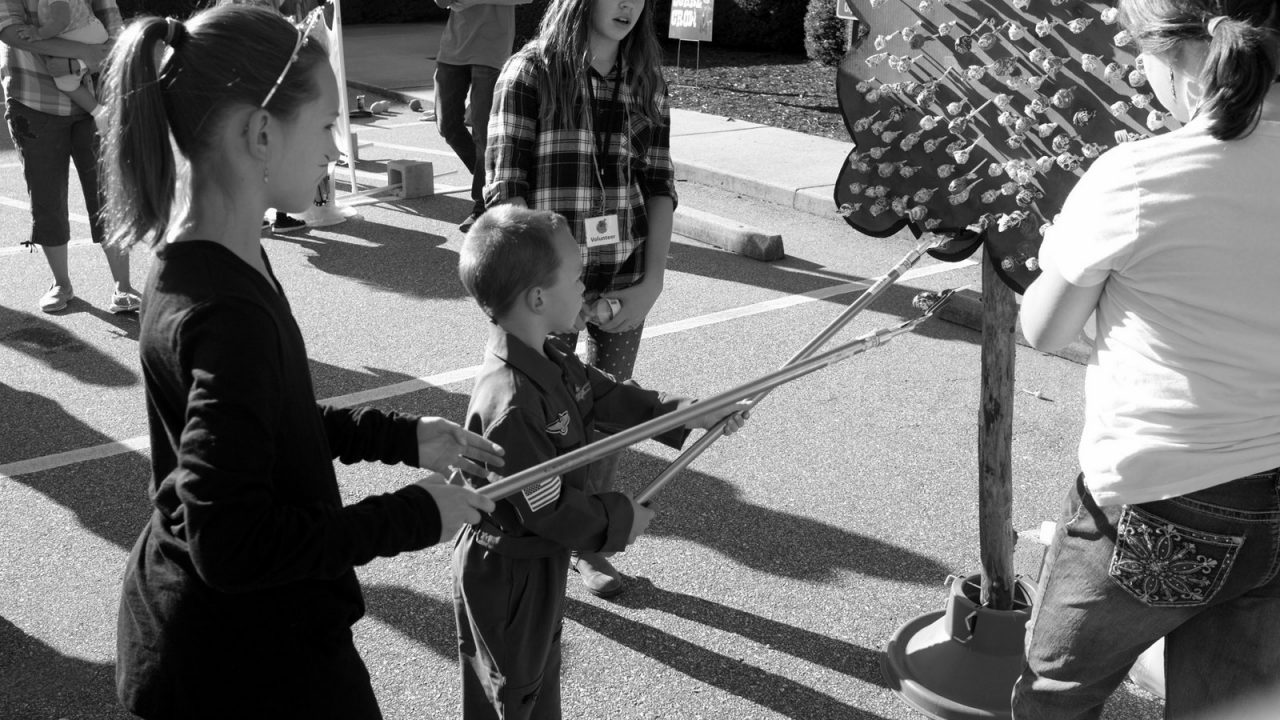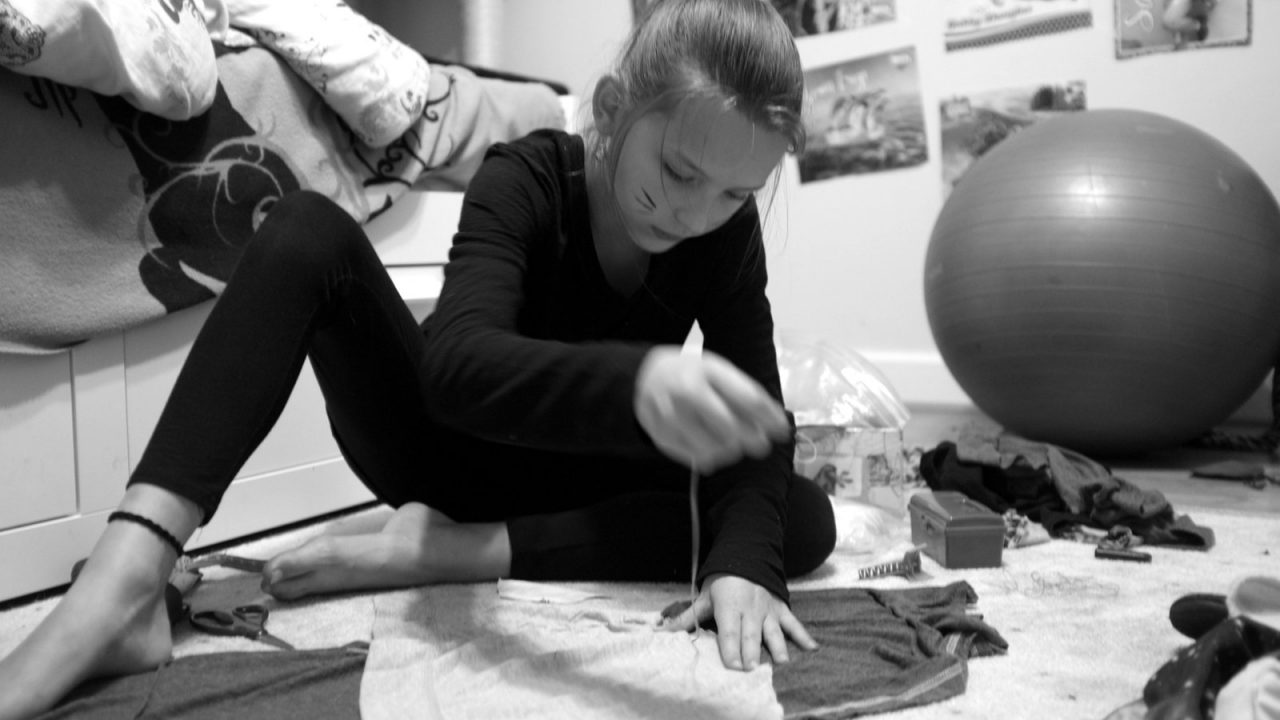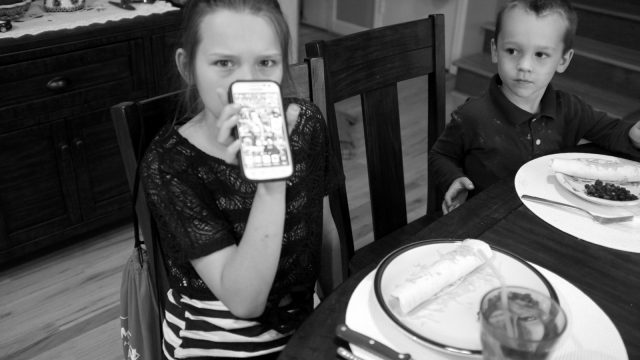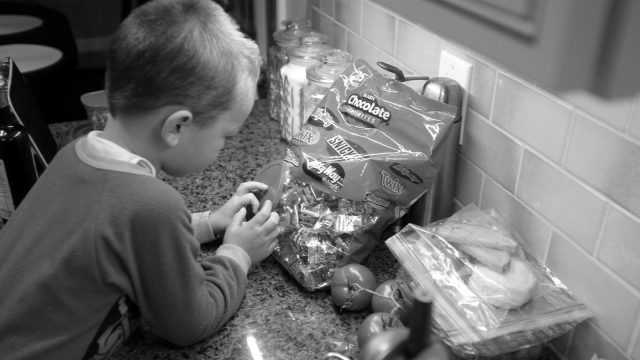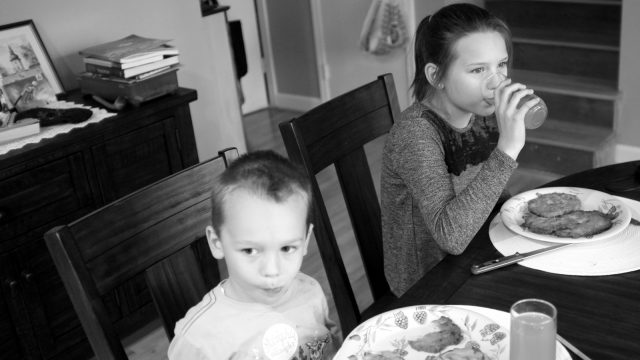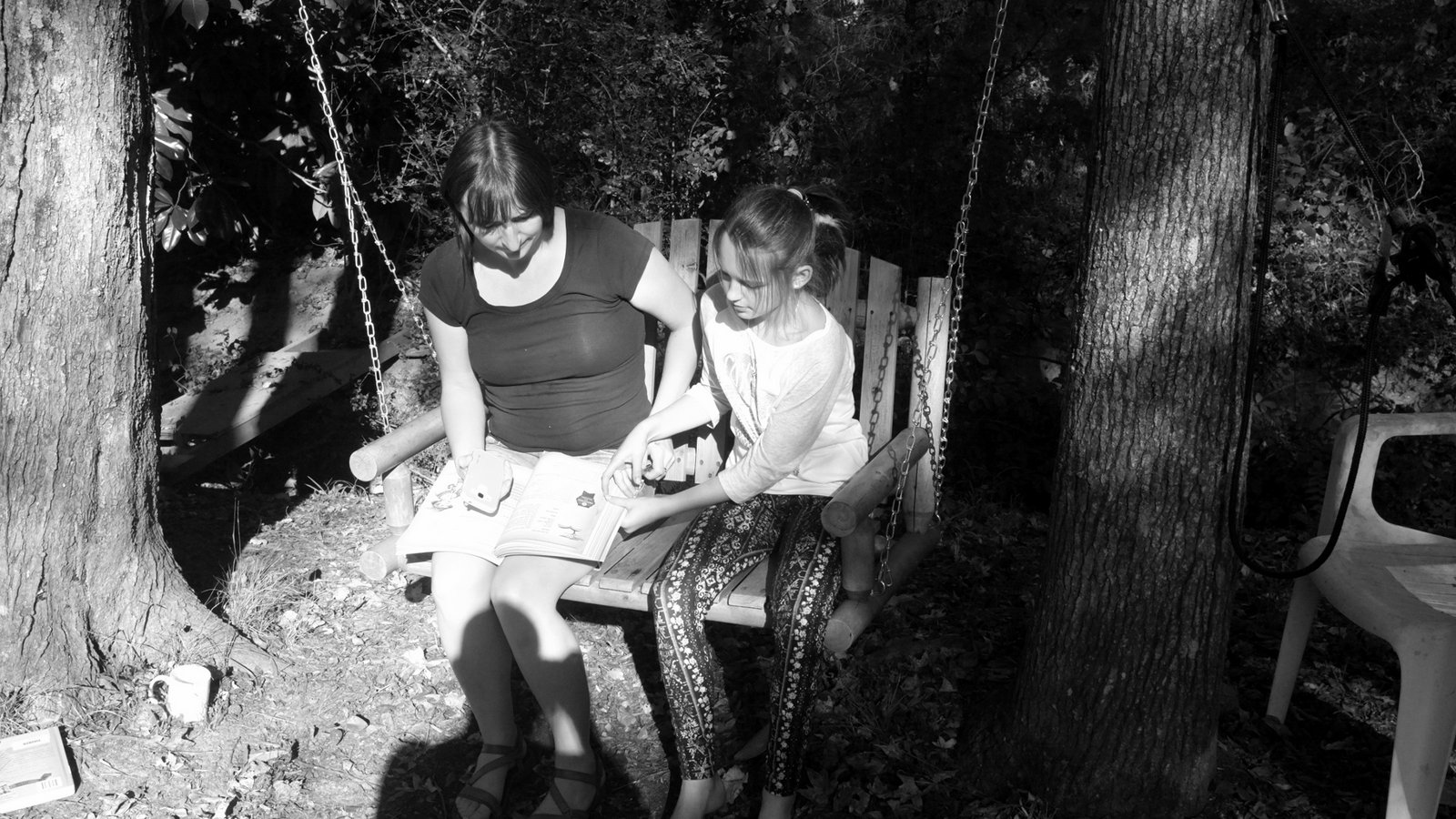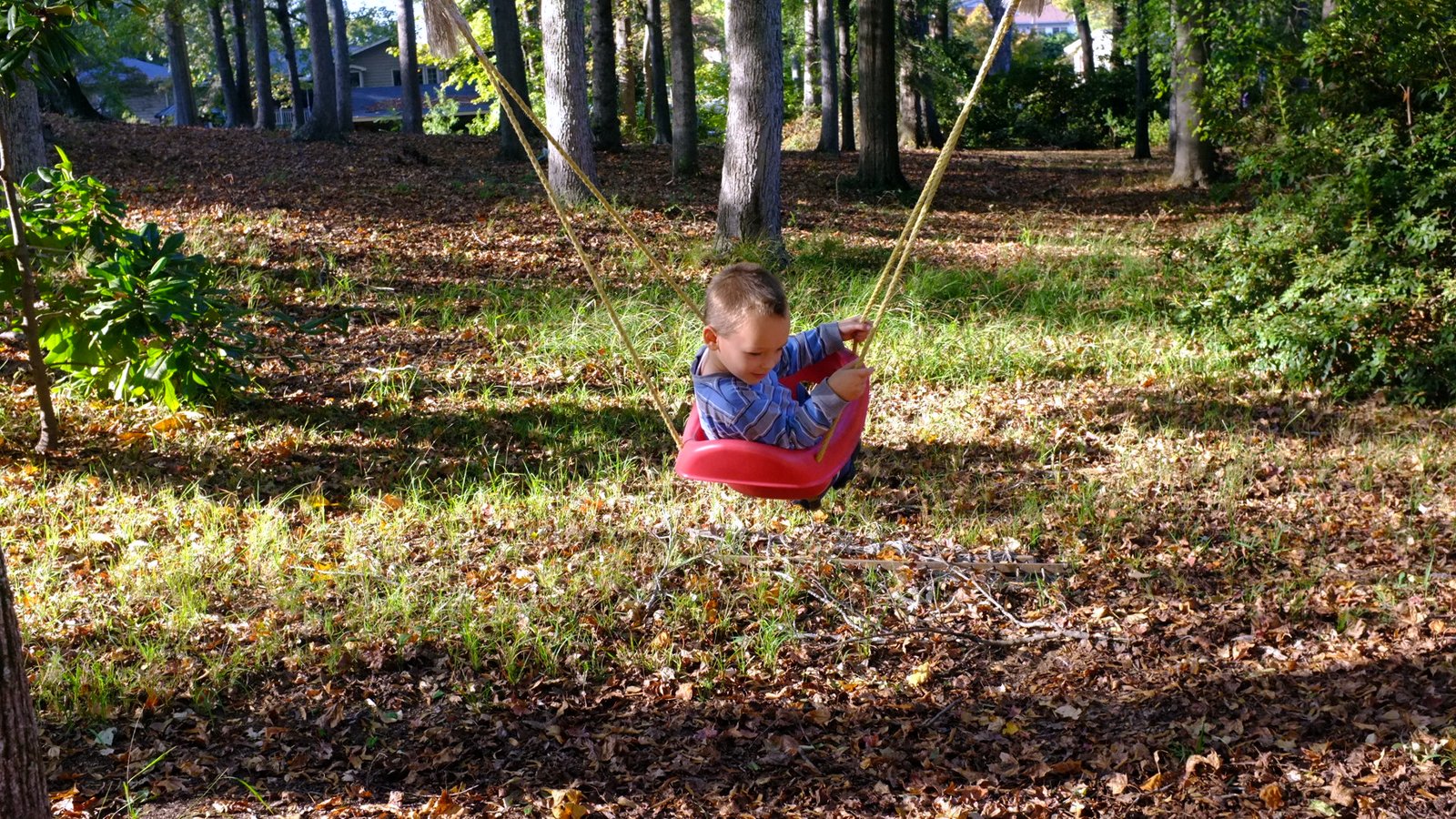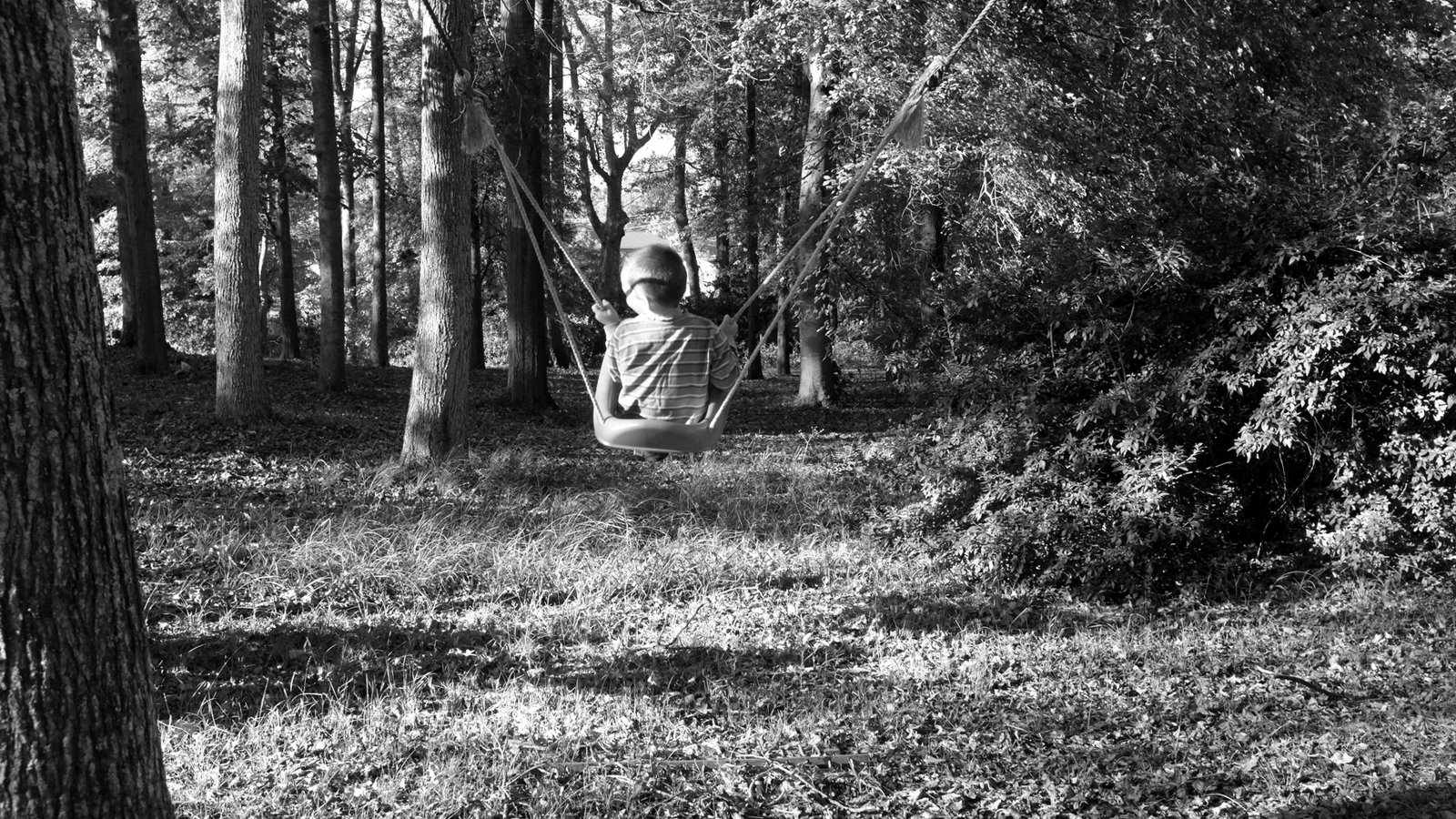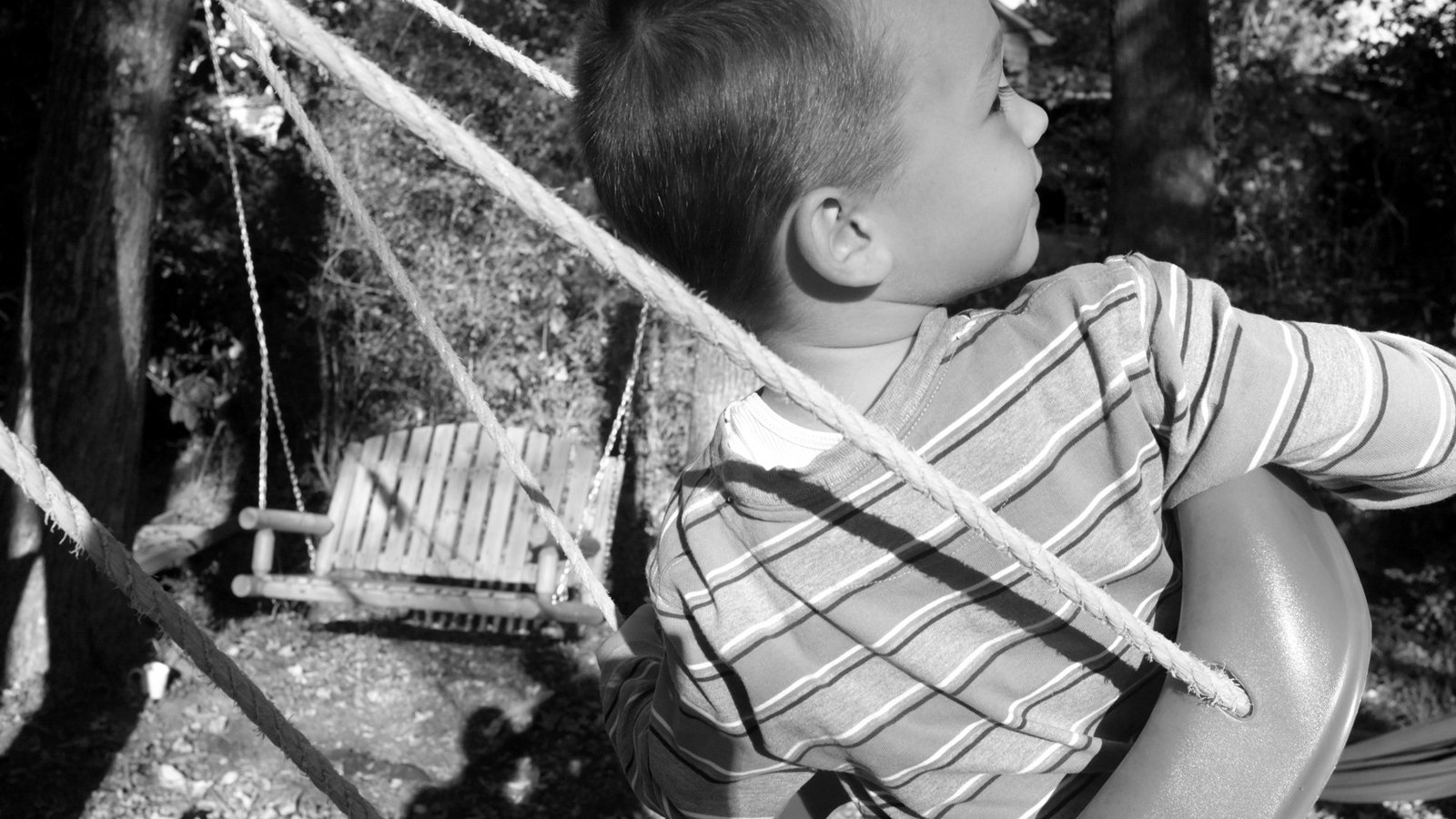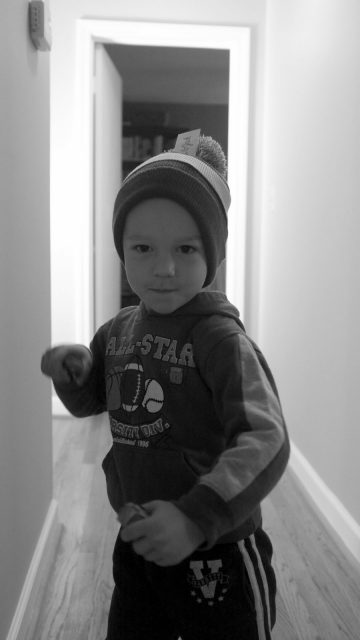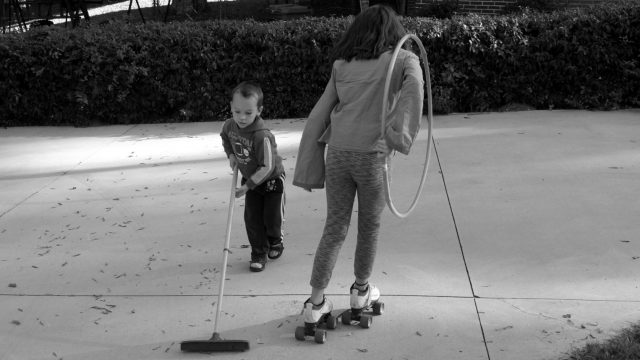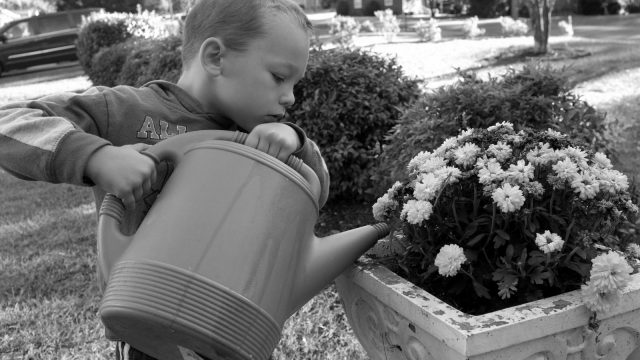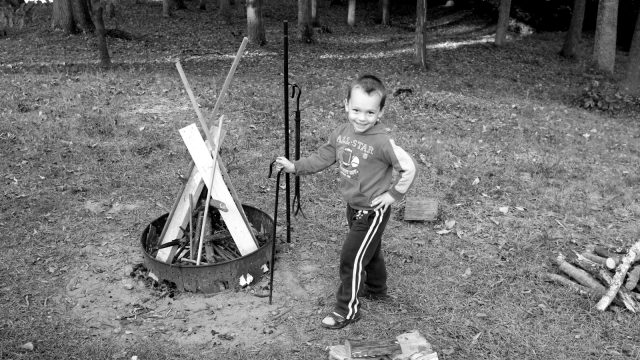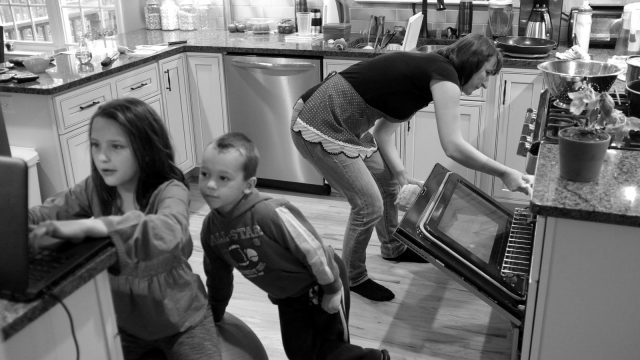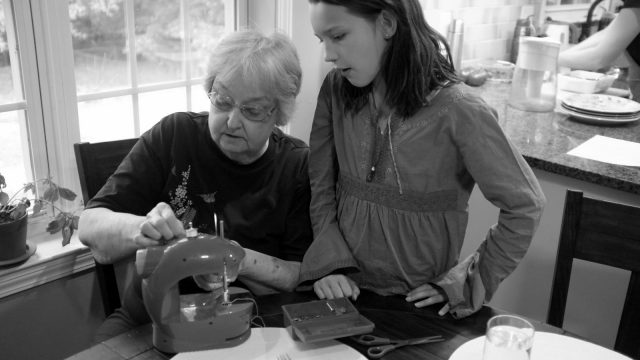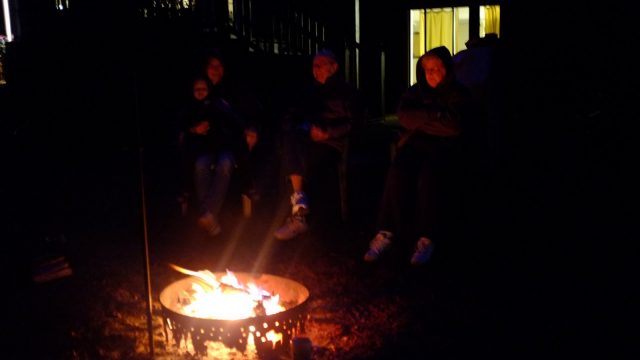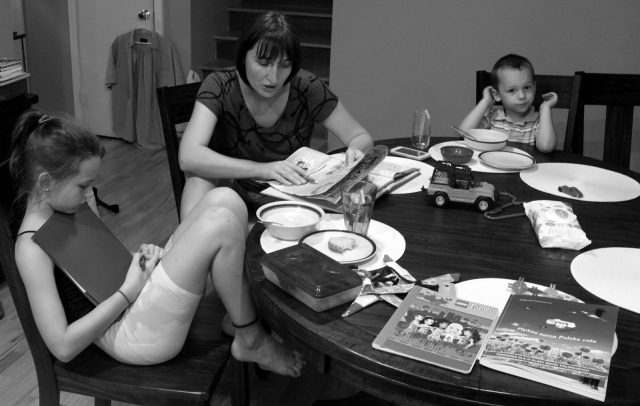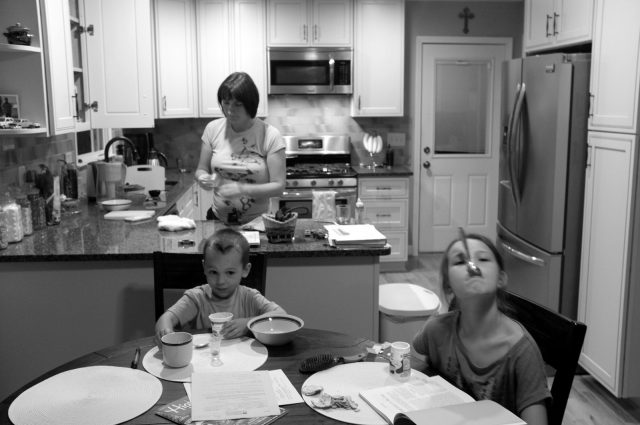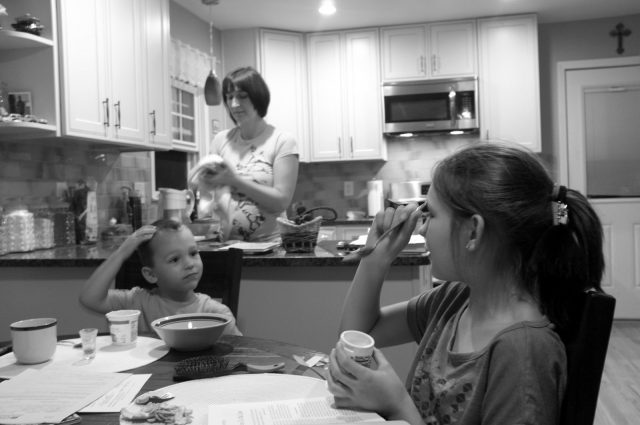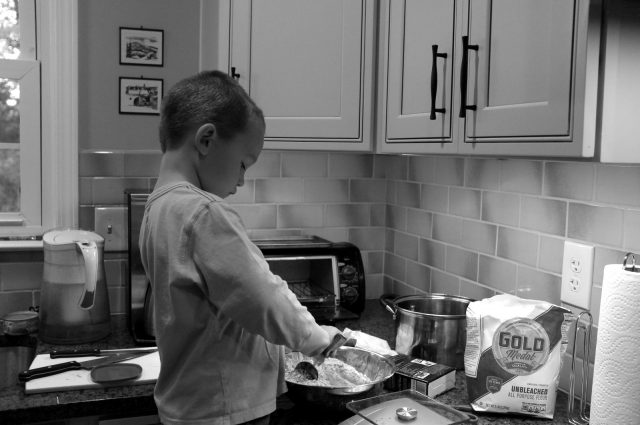Late October Sunday
With it being the last Sunday of the month, our family had a lazy morning that included a bit of television, a bit of computer, a bit of baklava, and a bit of exploring, all before lunch. The Boy and I went to our normal haunts, though we decided this time to go a bit deeper into the “woods” that consist of vines and bushes on the property behind ours, the house abandoned now for several years. We went deep enough that I had to crawl for a moment. Afterward, there was the usual: swinging, exploring the creek (where we found our lost ball behind our neighbors’ house), and lounging in the hammock. We were there when K came out onto the back deck to call us in for lunch.
“We’re being lazy on the hammock,” the Boy responded.
In the evening, Nana and Papa came by for dinner — another adventure in “we’re no longer worrying about whether our kids will eat what we cook because they can survive skipping one meal from hunger.” Of course that won’t really happen with the Boy: first, he’s too adventurous with his eating for that to happen, and second, when push comes to plate, he quickly reaches a point at which the stubbornness gives way to the hunger.







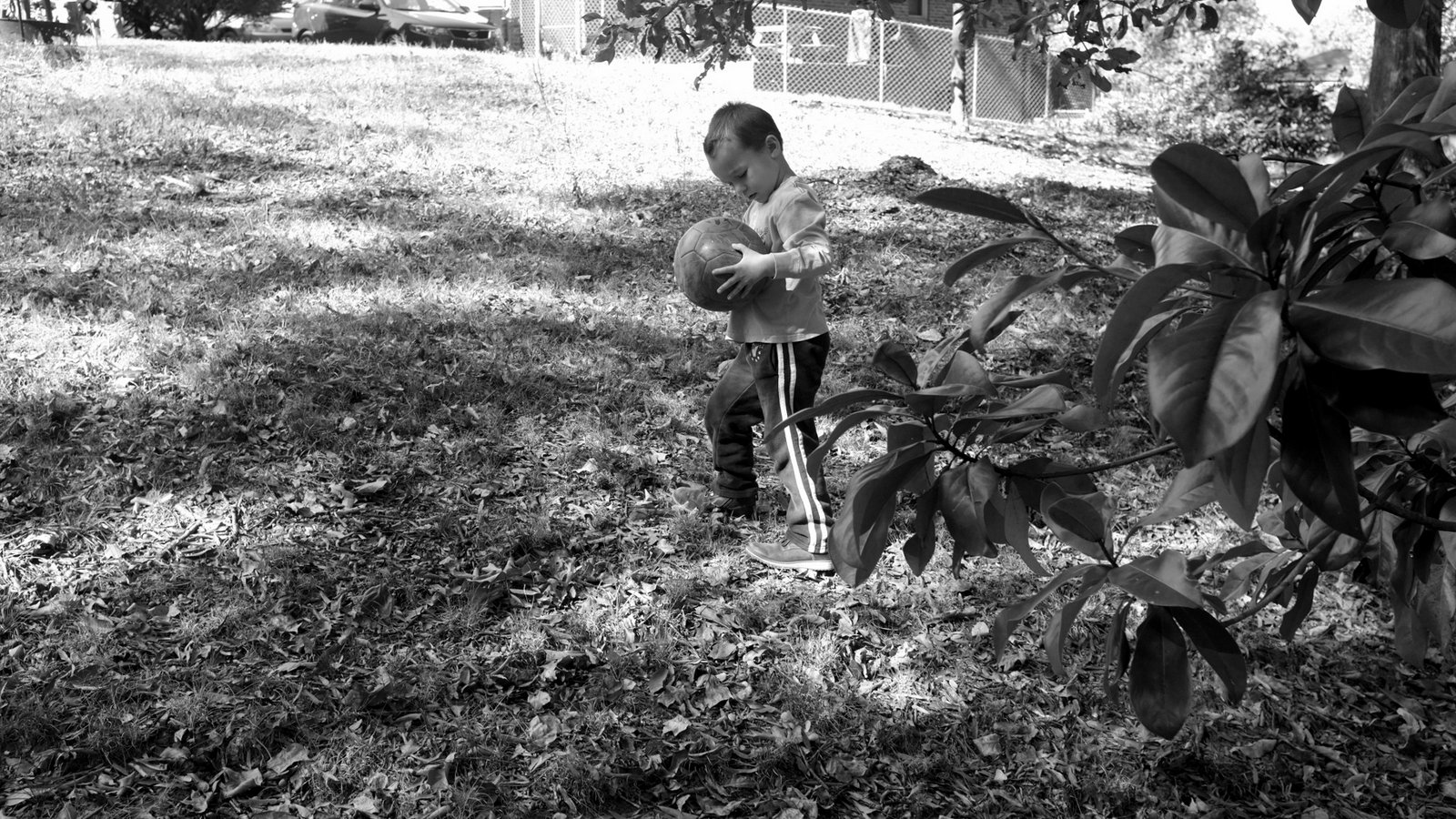
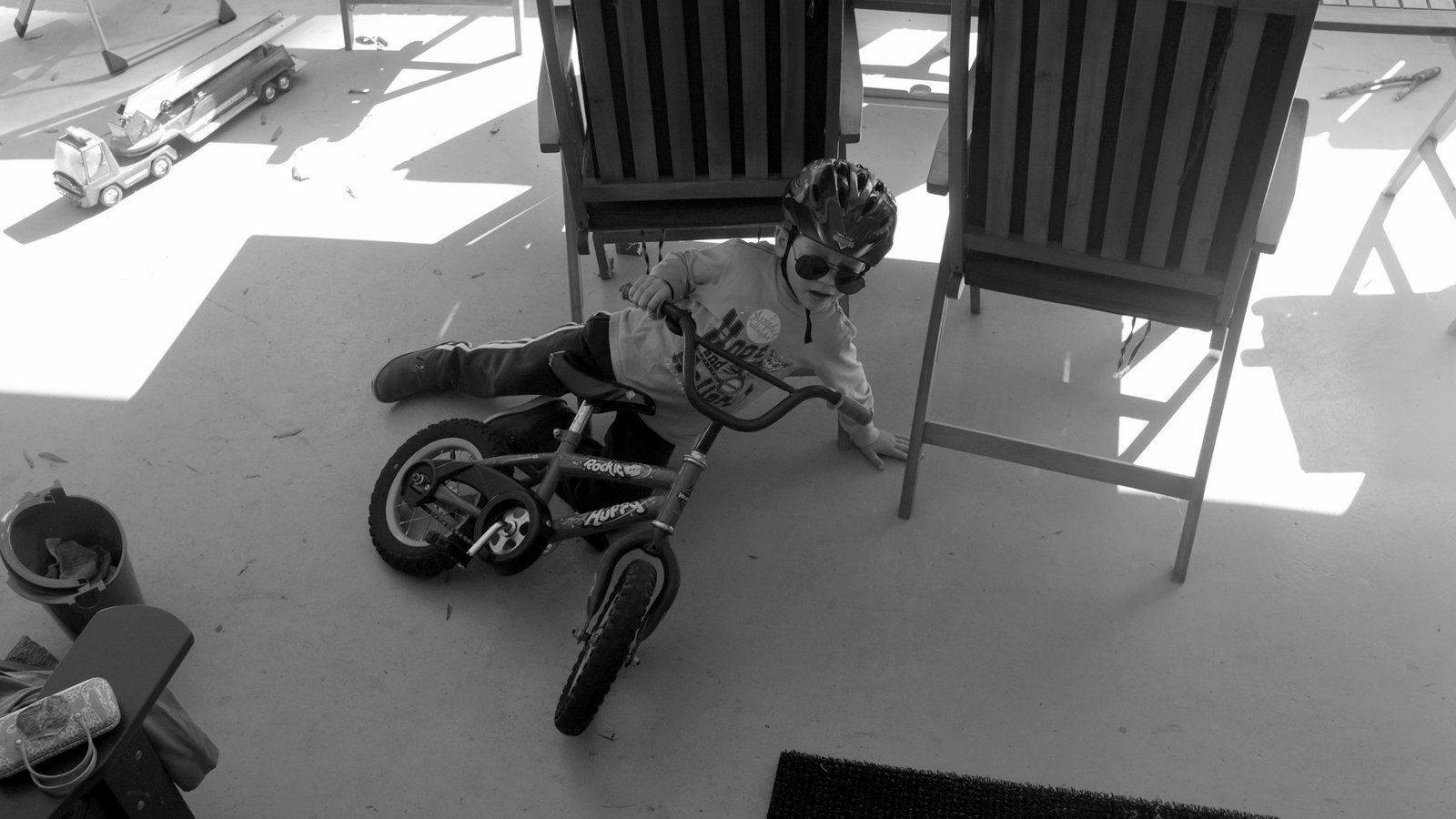
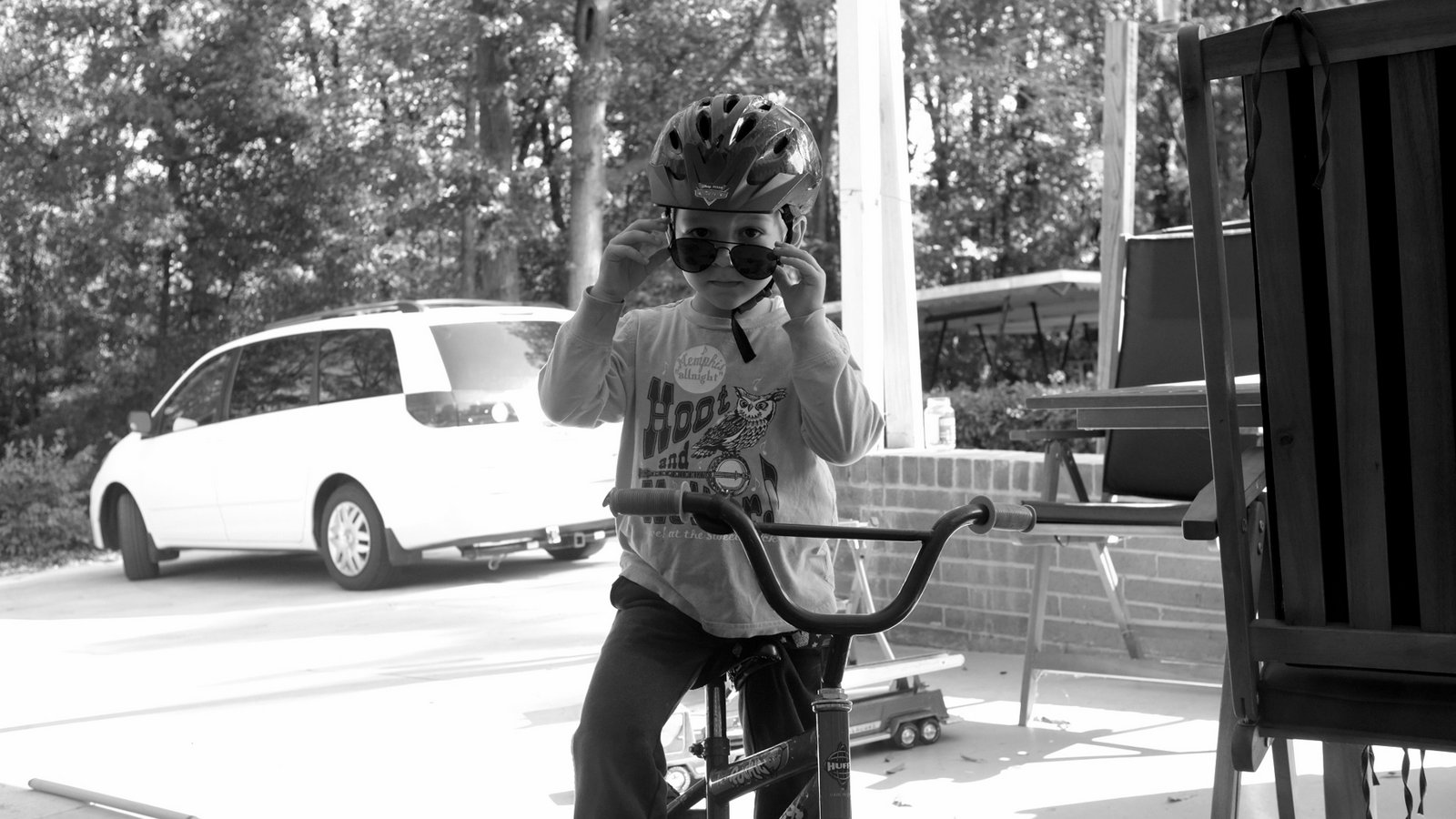
The Girl, of course, is an entirely different story, and I still wonder whether or not we’re doing the right thing by her. That’s the eternal worry of parenting, I guess, but I try to keep things in a more global perspective: hungry kids in Africa and all of that. Tonight was not all that much of a battle because it was tortellini: she likes pasta, though she predictably didn’t like the fact that it was pasta stuffed with something. Despite the fact that she likes pierogi, which are essentially the same thing.
Sometime later this week, we’re planning Indian — dal with palak paneer. That should be a really interesting night…
Pre-Halloween Halloween Festival
Overalls
Preconceptions
Every year, my students begin Romeo and Juliet with certain preconceptions, both about the play and about the character of Romeo. It’s a Shakespeare play, they reason. Shakespeare’s hard to read, noble and magnanimous and all that. He writes about noble ideas, noble dilemmas, high-minded philosophy. They don’t expect it when the play starts out and within a few lines, characters are saying things like this:
‘Tis all one, I will show myself a tyrant: when I
have fought with the men, I will be cruel with the
maids, and cut off their heads.Ay, the heads of the maids, or their maidenheads;
take it in what sense thou wilt.Me they shall feel while I am able to stand: and
’tis known I am a pretty piece of flesh.
I take them through the text enough to get them to realize that these two characters, like Donald Trump, are fond of locker room talk that involves suggestions of sexual assault. (No, I don’t bring in the politics, but the thought crossed my mind to make the connection at least today.) I don’t point out to them what Sampson really means when he says, “Me they shall feel while I am able to stand,” but I suspect some of them get it.
Then there’s Romeo: He’s going to be a good guy, they reason, because the play is the most famous love story of all time, and the most famous love story of all time can’t possibly have anything other than the ideal man in it. So we begin reading and find this passage in response to Benvolio’s queries about what exactly is making Romeo’s days so long:
Well, in that hit you miss: she’ll not be hit
With Cupid’s arrow; she hath Dian’s wit;
And, in strong proof of chastity well arm’d,
From love’s weak childish bow she lives unharm’d.
She will not stay the siege of loving terms,
Nor bide the encounter of assailing eyes,
Nor ope her lap to saint-seducing gold:
O, she is rich in beauty, only poor,
That when she dies with beauty dies her store.
“How has Romeo tried to win her?” I ask. We mark the text and make a list.
“She will not stay the siege of loving terms?” I ask, and the students figure it out.
“He’s used smooth words.”
“Nor bide the encounter of assailing eyes?” I ask, and the students get it.
“He’s been making eyes at her.”
“Good. Finally, ‘Nor ope her lap to saint-seducing gold’?” Here they stumble.
“Money?”
“No — how do guys use gold to win girls?”
Finally, someone gets it: “Oh, jewelry!”
“Right!” Then the question — should I pursue the issue further? Should I lead them to see just exactly what Romeo’s saying here? Some years, I don’t. This year, I did.
“And what about the rest of the line?”
They look at each other quizzically.
“What do you think he means by ‘ope’?” I ask.
“Open?” a student suggests.
“Correct. Now, she will not ‘ope her lap to saint-seducing gold’?” I see in some of their eyes that they’ve got it, so I suggest what I suggest every year. “We’ll have to behave as adults in this unit and not giggle and be immature about some of the topics. So what’s he saying?”
They get it. They’re mildly shocked. The girls are a little angry and disappointed that this supposed hero of the greatest love story of all time is a fairly typical male and simply trying to get Rosaline in bed — to spread her legs, literally.
“Nothing ever changes,” one student observes.
The Girl tonight hit on her own preconceptions and battled them mightily. Beans are nasty. She’s decided that already. Of course, at her age, I’d decided the same thing about a lot of things, most beans as well. But we have a rule in our house as Nana and Papa had when I was growing up: you have to try everything. In L’s case, it was about three bites of beans.
We jokingly took a picture with a time-stamp (that’s in fact illegible) to see how long it took her to eat them. Although she didn’t have to sit at the table the whole time, she had her final bite around ten minutes before bedtime.
I remember doing the same thing.
Nothing ever changes.
Saviors
One of the most disturbing things about Trump for me is his savior mentality: he often says things like “I’m the only one who can solve this problem” instead of something more expected from a presidential candidate, like “our party’s platform is the only thing that can solve this problem.” It seems he wants to create a cult of personality, something that frightens many of us.
But are his followers buying into it? A sign seems to answer the question.
That seems to be a near-perfect rewording of a traditional Christian formulation: “Jesus, who gave up his role in heaven to be humiliated, ridiculed, and crucified to save the world.” It also echoes John 3.16 in a way.
It’s a frightening sign, to say the least.
If we look closer at the implicit comparison, though, it becomes even more problematic. Jesus was ridiculed and humiliated because what he said went against the common thoughts of the time. He embraced those that society rejected, like the tax collector and the woman at the well. He taught unconditional love, and he was humble. Trump, on the other hand, rejects whoever angers him. He suggests punching people in the mouth, and he is anything but humble.
A false comparison, and a dangerous one, if I ever saw one.
Or perhaps it’s satire. It’s unlikely because I don’t see Trump smiling at a protester holding up a damning sign. Then again, he might not initially realize it’s satire.
Or perhaps it’s one of those meme-making sites that allows you to add your own message to a church billboard for an authentic-looking photograph.
Two of the three explanations don’t leave me gasping.
Forbidden Fruit
K bought a bag of treats for trick-or-treaters next week. It was sitting on the counter when E came down this morning.
He’s always the first of the two to come downstairs. We hear his little voice as we’re getting our breakfast ready: “Mama!” He needs his “stinky diaper” taken off, and he needs to get downstairs as fast as possible. Nevermind that often makes it downstairs half asleep and then plops down on the sofa in the livingroom for another half hour of sleep. He has to get downstairs.
So when he came down this morning, he noticed the candy.
“Why is there a bag of treats on the counter?” he asked.
“It’s for Halloween,” K explained.
She went back upstairs to do her hair and I peeked down to find he had taken the step ladder out and set it up to get a closer look. Elbows on the counter, chin in his hands, he just stood and stared.
It would take no cajoling at all to get him to eat the whole bag. Perhaps not all in one sitting, but then again, he might be able to pull that off. Then how he would complain about how his stomach hurts.
“My belly hurts” is his common excuse to get out of finishing dinner. Even when he says he likes it. Even when it’s potato pancakes.
In the evening, the Girl brought up a new concern. I actually brought it up; she worked it to a frenzy. Thursday is a special day for whatever reason, and the kids can take a stuffed animal to school.
“Daddy, I can’t decide which animal to take,” she explained.
Knowing the stinkers she has in her class, I reminded her that they might do something mischievous and to take that into account when deciding. A few minutes after going to bed, she came down to get some advice from K. She explained her concern: “When the teacher is not looking or when I go to the bathroom, one of them might grab the stuffed animal and do something to it, like cut it up.”
K gave the opposite advice: “Don’t worry about it. That probably won’t happen.”
But L was already worked up about it. She probably won’t get to sleep until late, and then we’ll have a rough morning, trying to convince her to pull herself out of bed.
Perhaps I should have thought things through a little more carefully.
Monday Afternoon
Chimney Rock 2016
It’s been some time since we went to Chimney Rock as a family. K and E went three years ago when L and I were in Poland for most of the summer. Before that, we’d taken L when she was a bit younger than the Boy. But we’d never been there, all four of us, so we remedied that, walking 9,717 steps, climbing over 1,000 steps (L and K counted) in the process. As a result, the kids were asleep just about as soon as they fell into bed.















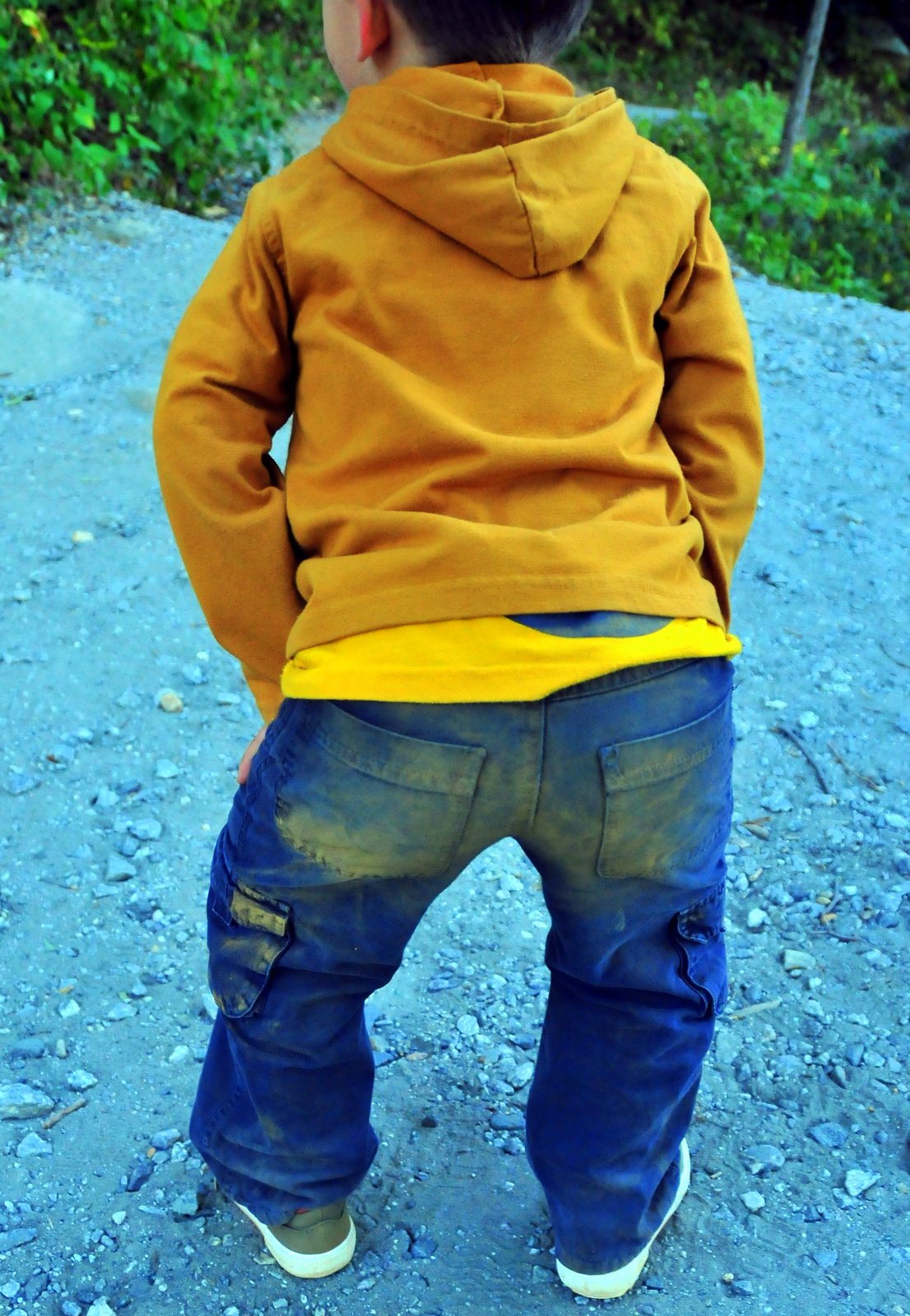


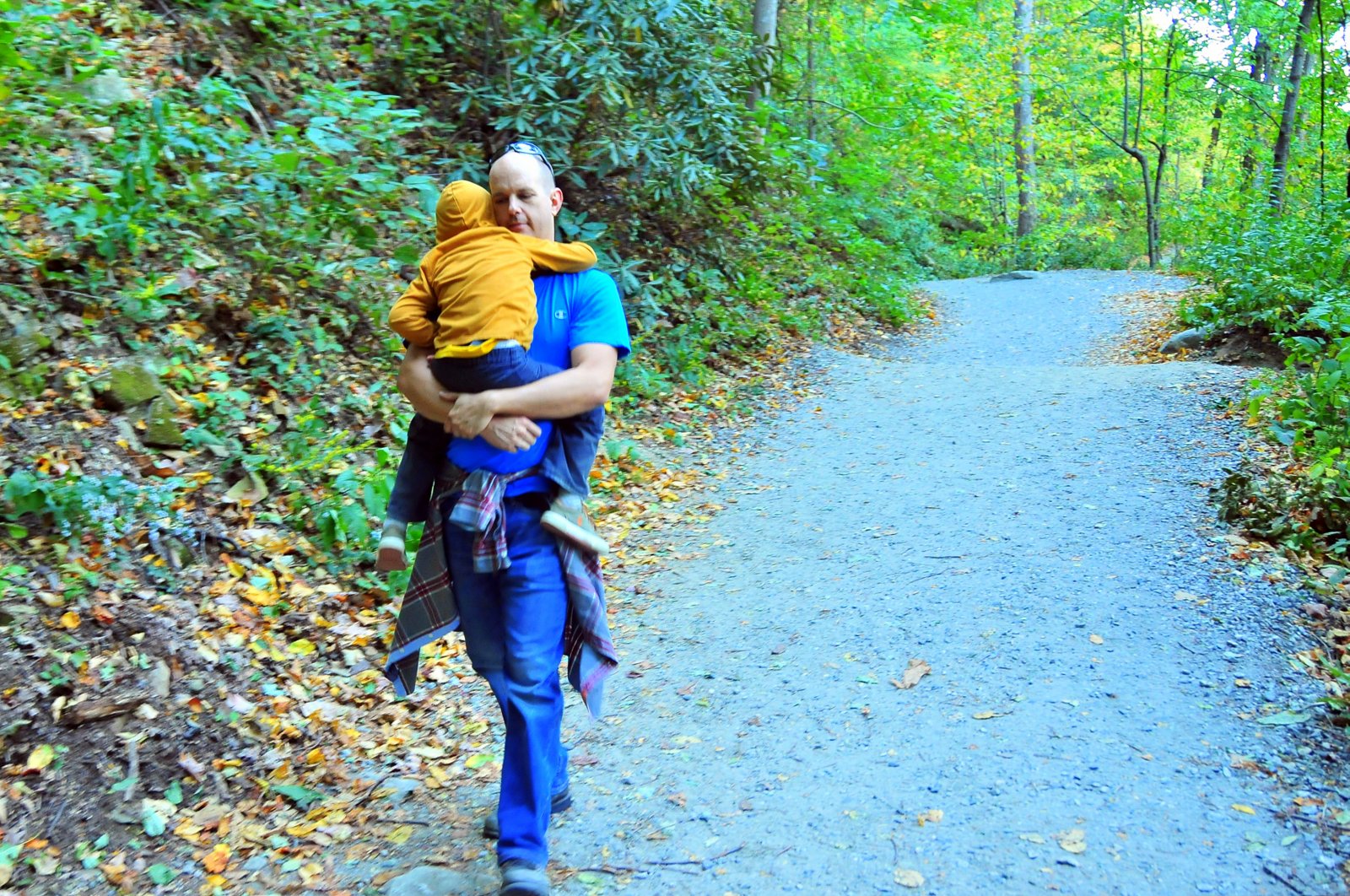
Saturday
What did I love about today? That E got his shoes on all by himself without much prompting and without help getting the correct shoe on the correct foot. It’s a sign of his growing independence that the little things he takes on himself.
That L helped him put on a hoodie that he was dying to wear without me even knowing she’d done it. It must have been a frustrating task, because the neck of that garment does not slip easily over his head. But instead of hearing any fussing, I heard nothing at all.
That they both found a way to entertain themselves. That E did so by working — his favorite type of play — and that L still is in love with skating.
That I discovered K is right: watering the flowers can be a delightful job. The Boy was eager to turn play work into real work. And I love that he’s always willing to lend a hand.
“Sure,” he always says.
That we have a small fire pit in the backyard. With it being so dry, it’s always a bit of a risk to have a bonfire, but we keep it small (despite the appearance of this — it was built up for the picture and for E to help) and have a hose at hand.
That life in our family can be so hectic and yet peaceful at the same moment. That our kitchen is done. That I managed to eat Brussels sprouts tonight.
That the Girl is so interested in crafts. Nana and Papa bought her a small sewing machine for Christmas some time ago (last year? year before?) and perhaps she was too young, because she’s just now getting interested in it.
That my family is my family.
Curve
Recently, our school district changed its grading scale for all high schools and middle schools, switching from a seven-point scale to a ten-point scale. In the past, the lowest A one could get would be a 93; now it’s a 90. Not a big change at the top end of the scale. But by the time you get to the bottom, it’s ten points. To pass with the old scale, you had to get a 70; now, it’s a 60. There was a grading floor of 61 with the old scale — the lowest grade a teacher could give was 61. That’s now a D. The new grade floor is a 50, which is the lowest F as well. In other words, a student can do absolutely nothing for an assignment and be 10 points from passing.
How does that affect the overall curve? When I put my quarter’s grades into the handy-dandy spreadsheet I use to calculate the letter grade spread of the class, I realized that I hadn’t updated the look up table that determines whether grade X is an A or a B, and so before I updated that table, I saved the old version for comparison.
| A | B | C | D | F | |||||
| 16 | 33 | 39 | 46 | 33 | 26 | 17 | 21 | 34 | 13 |
It more than doubles the number of A’s and cuts by almost 67% the number of F’s. On the bright side, look how much better kids these days are doing!
Mixed feelings on this. On the one hand, a lot of the people getting D’s now instead of F’s might need a bit of a confidence boost that finally not failing might give some of them.
On the other hand, most all of the students who have F’s have them because they don’t complete a significant number of assignments. It’s not that they’re trying, struggling, and failing — they’re not even make it past the “r” in “trying,” let alone the rest of the sentence. So what does this teach them?
I can’t help but feel that this is just another example of trying to rig the system so that the results look better. How do we decrease the number of high school drop-outs? Lowering the standards for passing might be one way. But in the end, what does that do?
Arriving Home
After a long day, arriving home at almost eight because of an open house event at the school, I find my family still all around the table.
“Still eating dinner?”
“No, they said they weren’t hungry, so they saved it for later.”
Creamy cauliflower soup with bacon bits — what’s not to love about that little bowl of goodness? Perhaps next time.
Helping



Evening Snack
“I’m hungry.” It can come has a plaintive request, a frustrated fuss, or a simple statement of fact, but come bedtime, come bath time, it’s always the same.
It doesn’t matter how much dinner they ate. It doesn’t matter whether we had watermelon, ice cream, cake or anything else as desert. They’re always hungry.
The Boy pulls the step ladder we’ve added to our kitchen due to the high shelves and begins rummaging through the refrigerator. The Girl takes a yogurt, adds a graham cracker, then tops it off with a mandarin orange. The Boy sees the orange and wants to add one of his own.
It’s a moment to offer thanks that we have food for our kids whenever they get snacky.
Drawing
Sunday Lazy Sunday
Sick Saturday with Old Friends
“Door” in Polish is a strange word. Like “pants” in English, it’s always plural — drzwi. It’s likely because it’s etymologically connected to “tree” and “wood,” and since old doors were made of planks, it makes sense to call them something like “planks” (though that’s not what drzwi translates to literally).
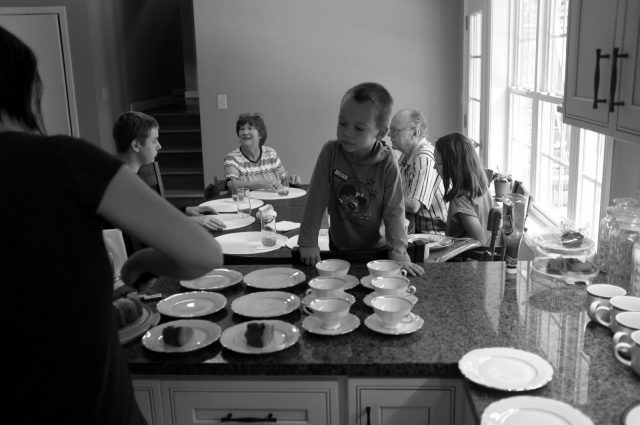
This morning, the Boy went to tell K as she was getting ready for a shower that he’d heard a scratching at the door, that it was Bida, our cat, who was trying to get his attention so that he would let her in, that he heard it and wondered what it was, that he’d figured it out, and that he let her in. K stood patiently, towel wrapped around her, listening to this whole story patiently, then asked, in Polish, for privacy: “Could you please shut the door so that I could shower?”

He replied, in English: “I’ll close them and lock them so no one will come in.” He applied Polish grammar to English, pluralizing a word that would be plural in Polish but is singular in English.
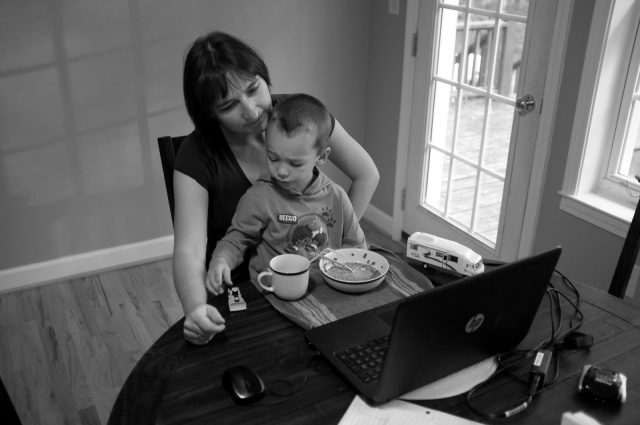
The Nap
Some days, no matter how good you feel when you wake up, no matter how bright the sun, how promising the day, the thought of going back to bed just seems to linger throughout the entire day.

It’s not the haze of lack of sleep I speak of, that fog that seems to be almost physically discernible in the mind, as if a heavy set of drapes were spread across your brain. That is something that you shake off with your first cup of coffee, or on cold winter mornings, with that first bracing encounter with the early air.

This is somehow different.
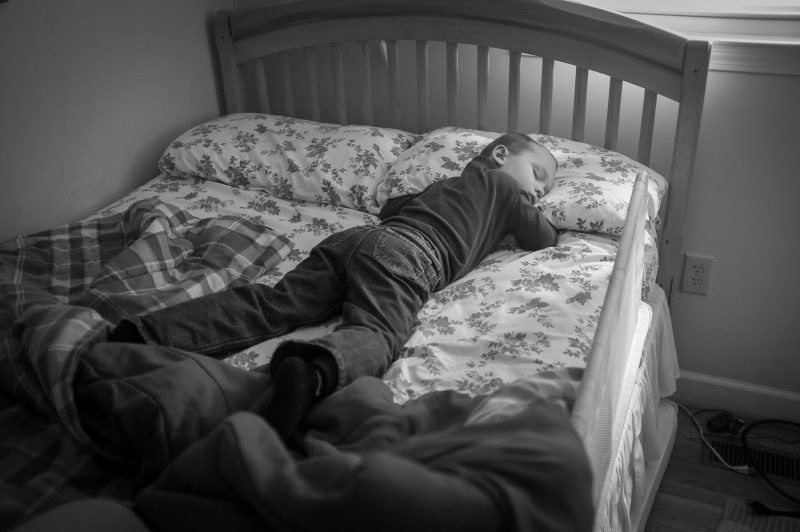
Somehow, but not much.
Muffins
Leki
Our family seems to be a blended family in one sense: immunity to illness. It seems I never really get sick. K said the other day that she thought she could probably count all the times I’ve been really sick — not just feeling a little bad and going to bed early one night — during our marriage. Unfortunately, the reverse is not true: it seems that K makes up for my relative lack of illness.
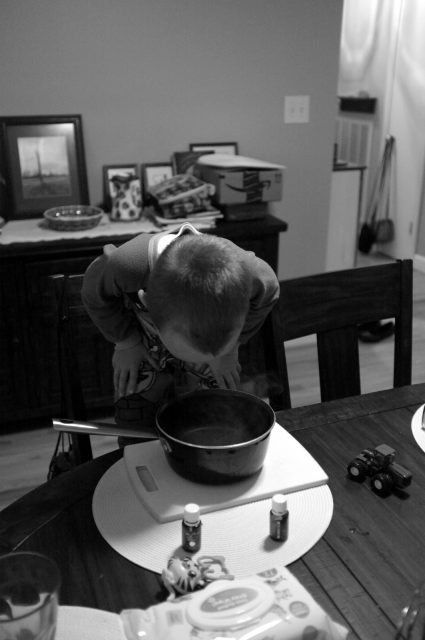
So we were both a little curious regarding who would most influence our children’s genetics in this regard. Obviously, the best case scenario would have been to take my immune system in its entirety and leave K’s behind. Equally obviously, the worse case scenario would be the opposite.
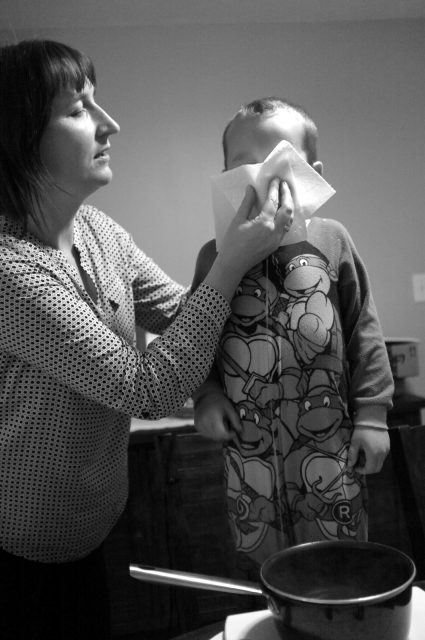
The obvious happened: the kids got a bit of both, probably making them fairly normal.
